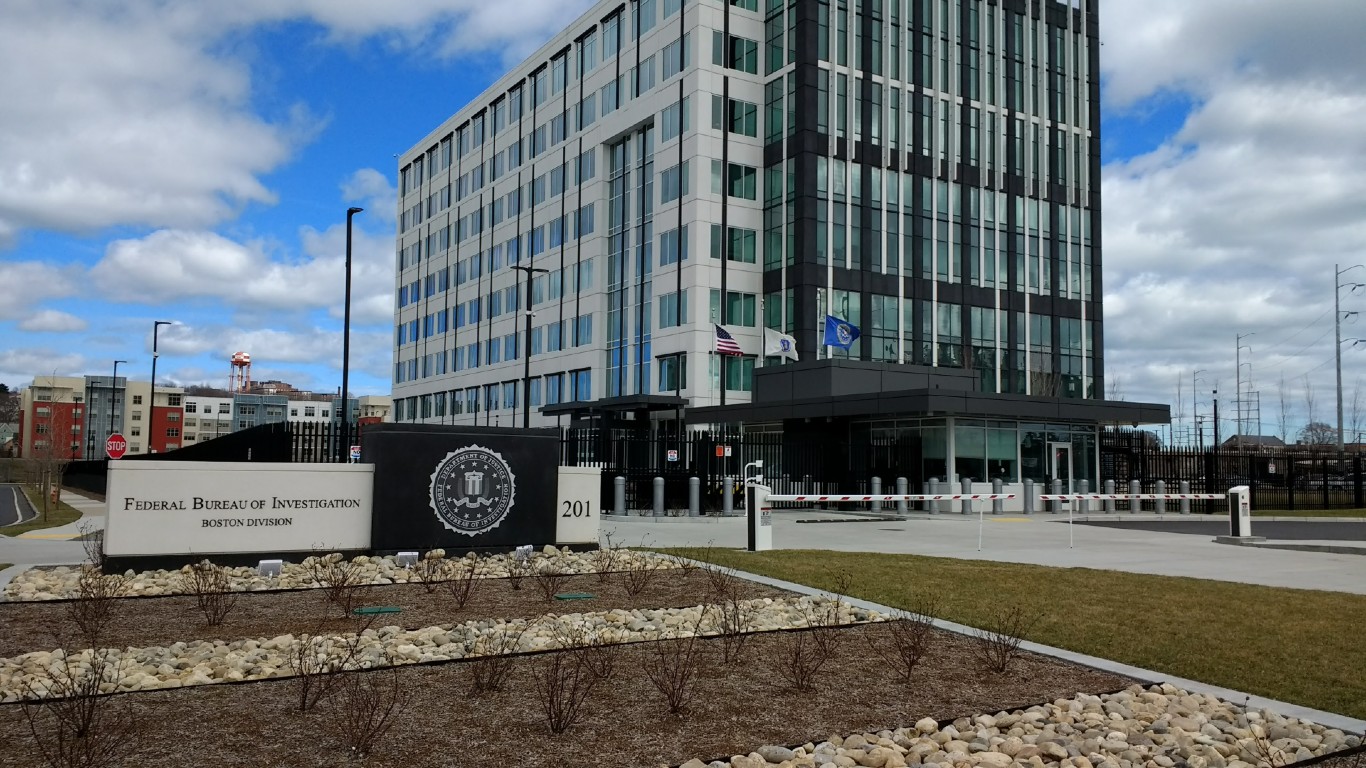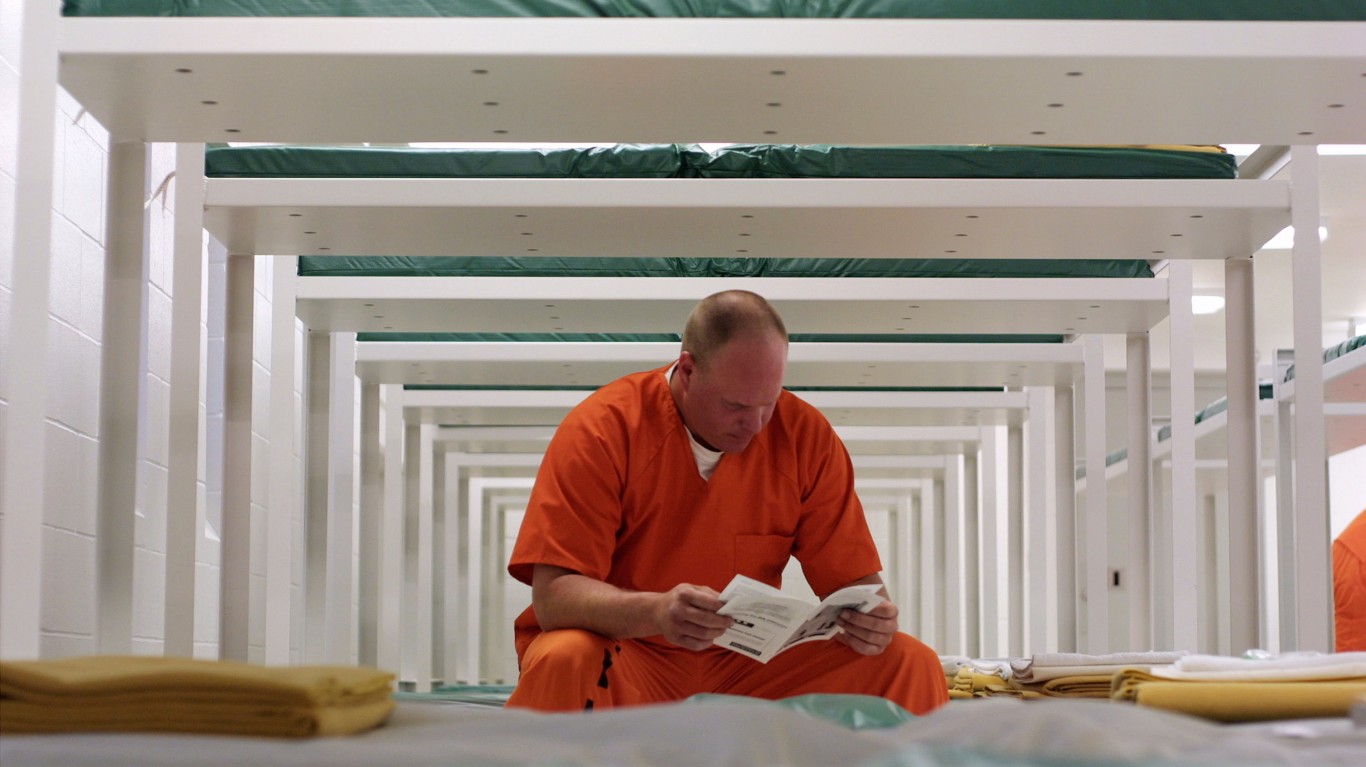
Americans are growing less trusting of their political institutions. Per a Gallup poll, less than 40% of Americans have “a great deal” or “quite a lot” of confidence in the presidency, which has been the case since 2010. More than 80% of Americans have had “some,” “very little,” or “no” confidence in Congress for well over a decade.
This distrust in American politics likely stems, at least in part, from the litany of scandals that have ensnared civil servants at every level. While misconduct at the national level, like Watergate or President Bill Clinton’s extramarital affair, tend to get more attention, corruption has been found at the state level in every part of the country.
24/7 Wall St. reviewed local news reports, media coverage, and other historical documents to find the worst corruption scandal in the history of each state.
While these scandals are each unique, they all have some common DNA — someone with some amount of power from the public position they hold using that power to benefit themselves or their family. Regardless of location or political affiliation, it seems that all types of American officials are susceptible to malfeasance.
In some instances, these scandals are simple cases of politicians accepting bribes in exchange for promoting favorable legislation for a business or an individual. In others, the scandals are of officials taking funds meant to help the community and spending it lavishly on themselves, buying houses, cars, and vacations. Still others are more complex ordeals, involving blackmail, false accusations, extramarital affairs, and sometimes even murder.
Unethical conduct is nothing new with some instances of wrongdoing on this list coming to light over a century ago. And despite increased regulation such conduct persists with some cases of misconduct being actively prosecuted as of June 2021.
Corruption does not exist in a vacuum, and rampant misconduct can indicate a lack of institutional control. This can come from scant laws on how officials should behave, lax enforcement, or even a pervasive culture of unethical dealings. These are America’s best and worst run states.
Click here to see the worst corruption scandal in each state
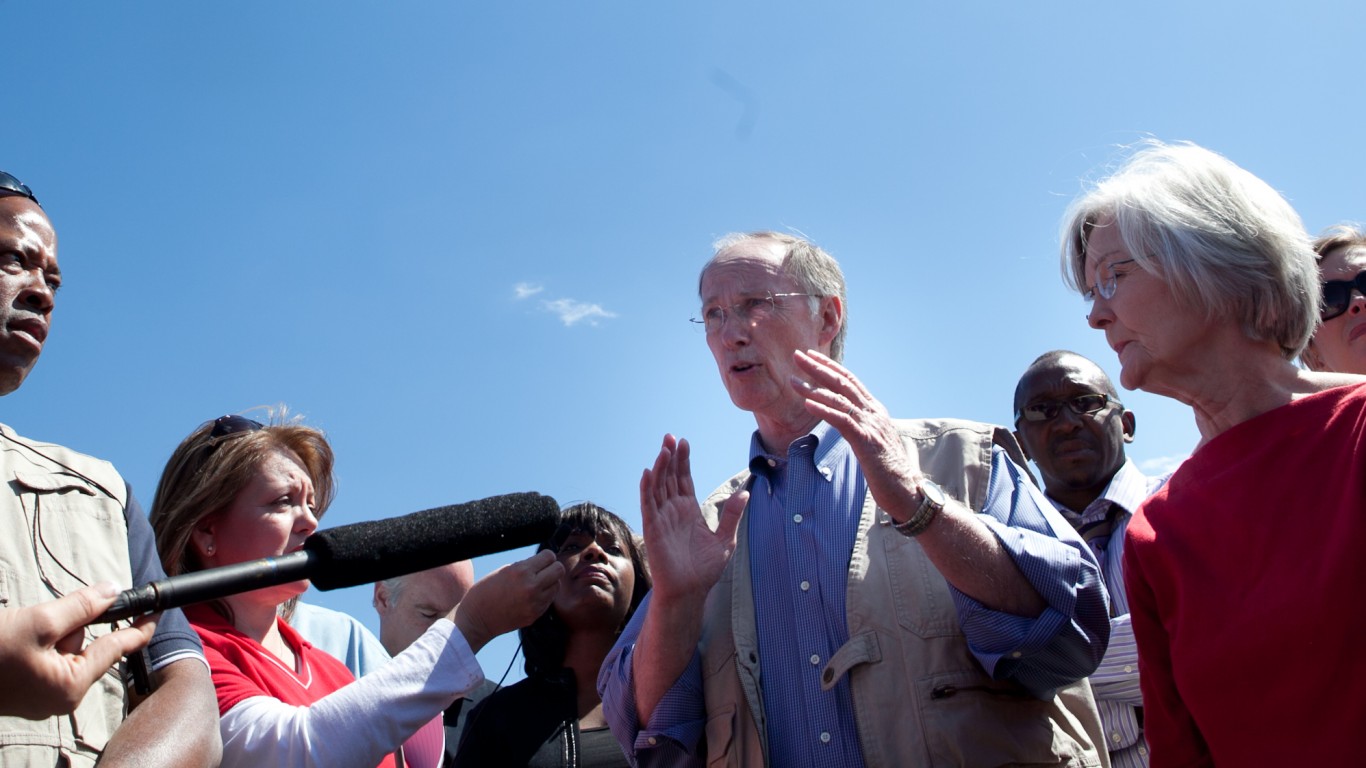
1. Alabama
> Scandal: Gov. Bentley resigns
> Year: 2017
Facing impeachment for misusing campaign contributions, Robert Bentley was forced to resign as governor in 2017. Bentley pleaded guilty to using campaign contributions for personal gain and to failing to report campaign contributions. Prosecutors say he did this to conceal an affair with a former staffer. A state House Judiciary report released just before his resignation included testimony from current and former state employees who said they were pressured to keep Bentley’s affair secret.
[in-text-ad]
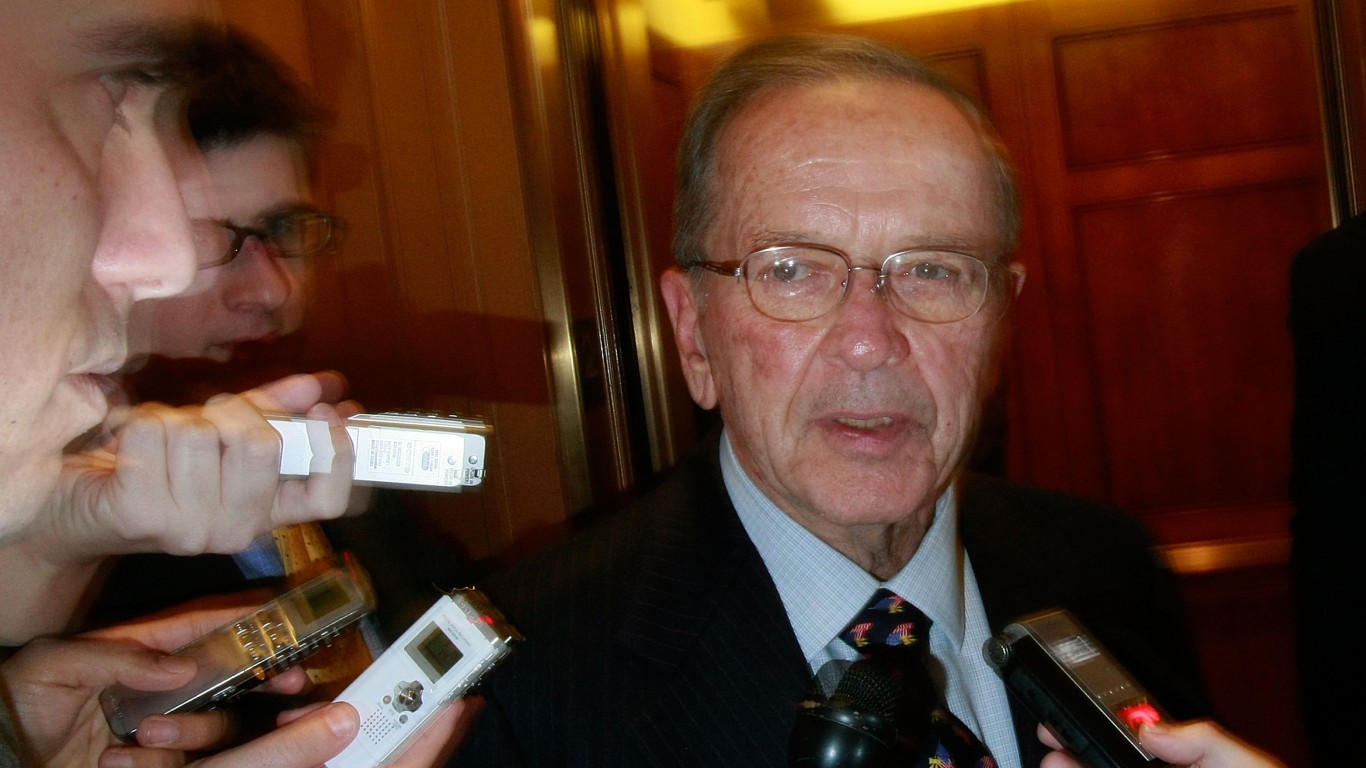
2. Alaska
> Scandal: Sen. Stevens investigation tainted
> Year: 2008
Sen. Ted Stevens was hobbled by a corruption scandal in 2008 that probably cost him the election. Prosecutors had claimed Stevens failed to report the full value of renovations performed on a house he owned in Alaska, which were provided by an oil company executive.
However, a federal judge in 2012 determined from a special investigation report that Justice Department prosecutors hid evidence that could have potentially helped Stevens defend himself — including statements from a renovation foreman that indicated Stevens tried to renovate his home ethically by paying full price for the services. Stevens never got the chance to try to clear his name. He died in a plane crash in 2010. A special counsel report found that prosecutors “abandoned all decency and sound judgment when they indicted and prosecuted” Stevens.
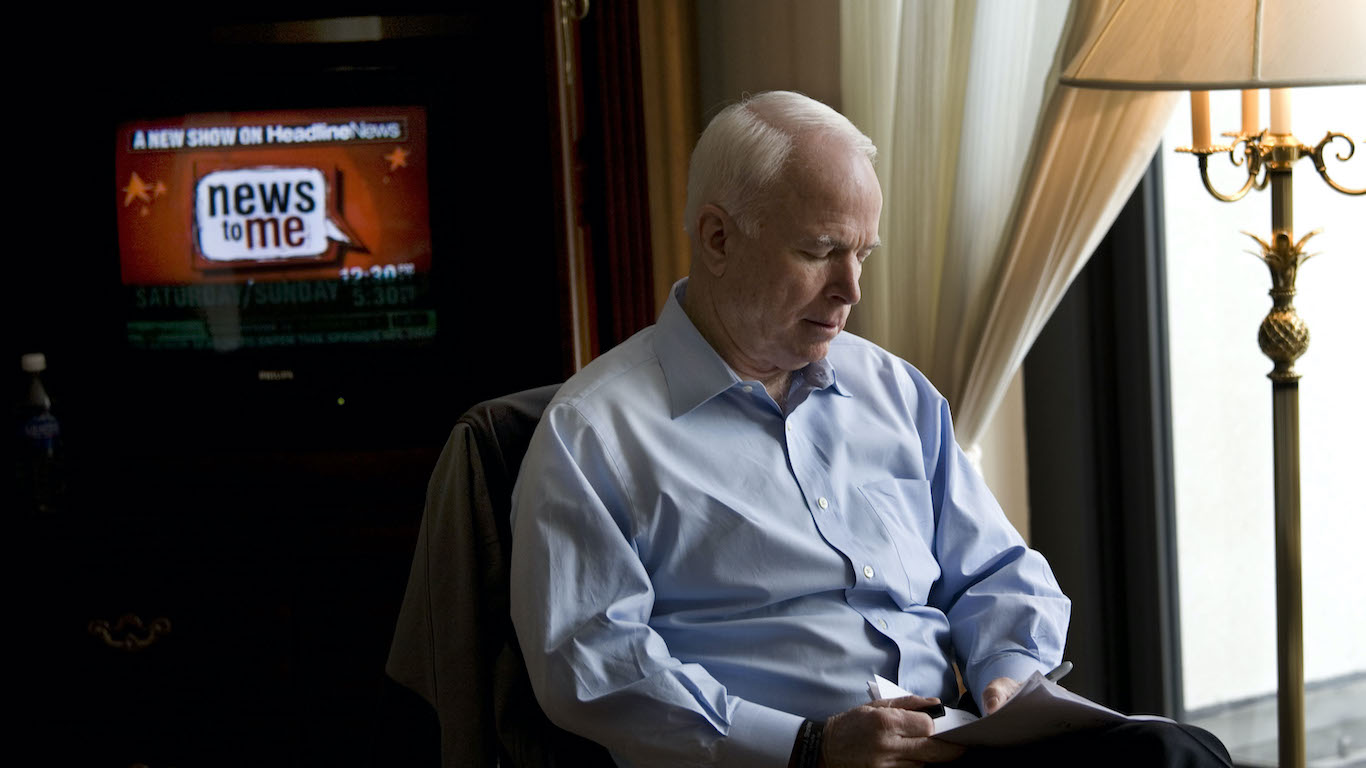
3. Arizona
> Scandal: Keating Five savings and loan scandal
> Year: 1989
Arizona senators John McCain and Dennis DeConcini were two of five senators involved in the Keating Five scandal. The incident involved legislators who intervened on behalf of the failed savings and loan Lincoln Savings and Loan Association to help the business fend off a federal investigation into potential misconduct. All of the senators had received political contributions from Lincoln executive Charles Keating.
Eventually, Lincoln was seized by the Federal Home Loan Bank Board. Lincoln’s bailout cost taxpayers over $2 billion. A Senate Ethics Committee said DeConcini’s conduct was “inappropriate” but did not break any rules. The committee determined that McCain had exercised “poor judgment” when he met with regulators, but he was cleared of all charges.
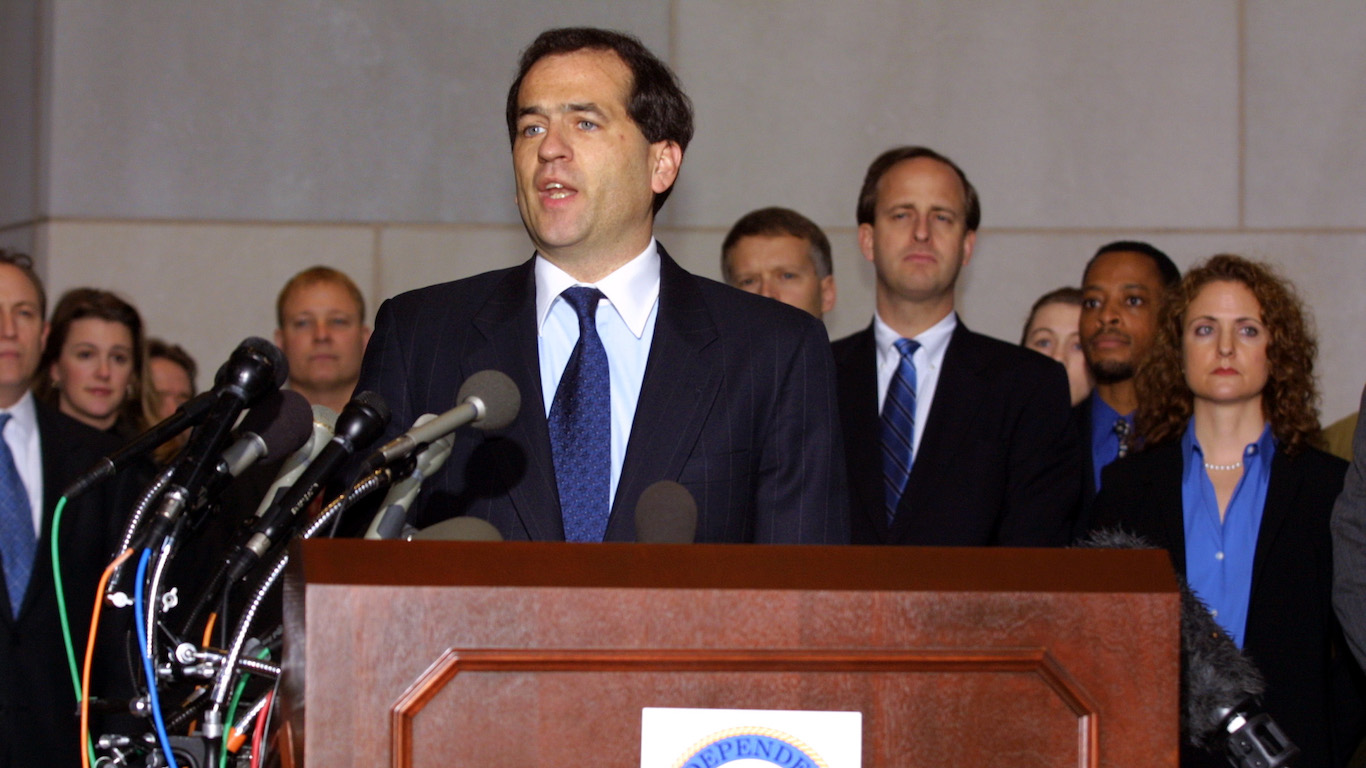
4. Arkansas
> Scandal: Whitewater real estate scandal
> Year: 1992
The scandal that followed the Clintons to the White House originated in their business dealings with a real estate company and a savings and loan. In 1978, then-Arkansas Attorney General Bill Clinton and his wife Hillary partnered with James and Susan McDougal to form the Whitewater Development Corp. to build vacation homes. The alleged improprieties stemmed from loans on land deals from James McDougal’s savings and loan Madison Guaranty.
Questions about speculative land deals drew the interest of federal investigators in 1984. Investigations into alleged misconduct involving Whitewater and Madison Guaranty would continue throughout Clinton’s presidency. The Clintons never faced any charges related to the inquiry.
[in-text-ad-2]
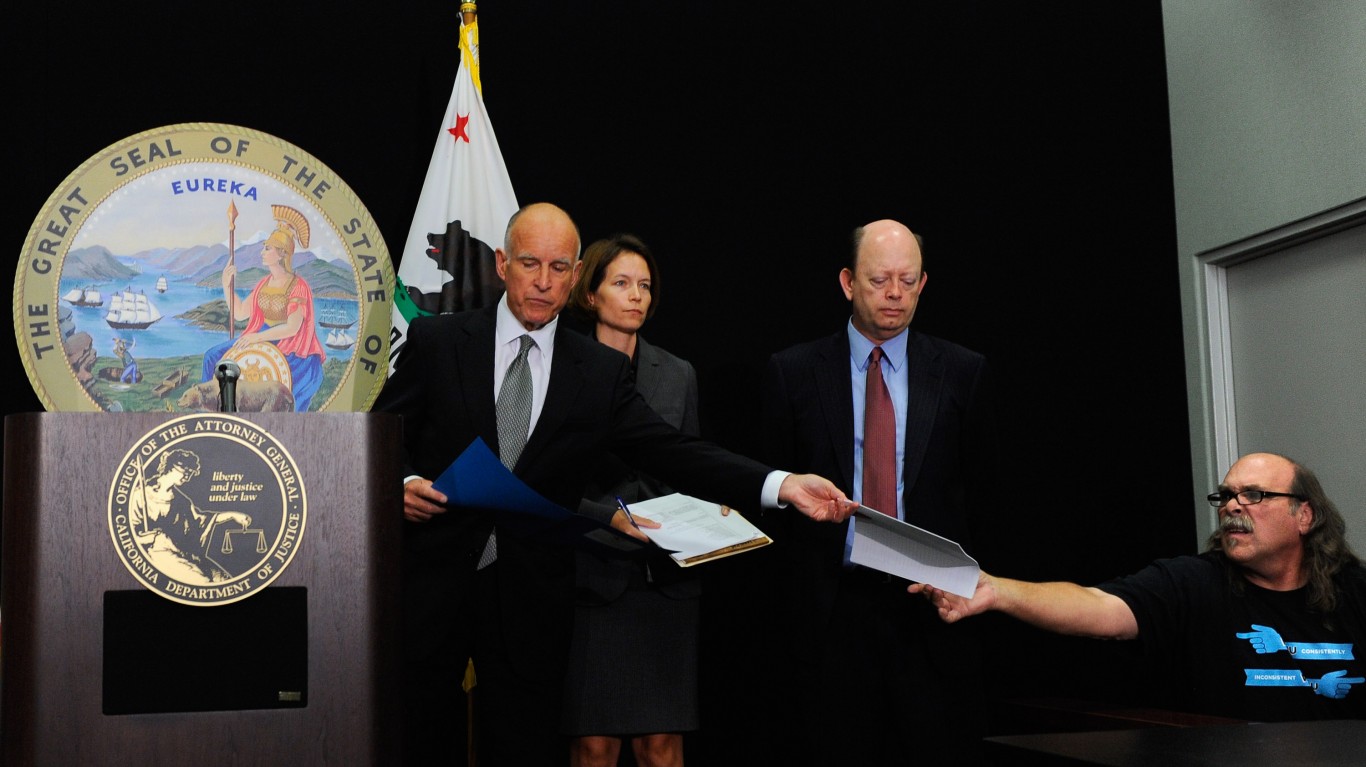
5. California
> Scandal: Salary scandal in town of Bell
> Year: 2010
City officials bilked the blue-collar town of Bell, California, out of $5.5 million in a scandal that broke in 2010. Robert Rizzo, the former city manager, received a 12-year prison sentence and was ordered to make restitution of $8.8 million. He pleaded no contest to 69 charges of fraud and misappropriation of public funds. Rizzo had drawn a salary of $800,000 in a city of about 40,000 where one-fourth of the residents live below the federal poverty level. Rizzo also was guilty of income tax evasion.

6. Colorado
> Scandal: Convention center bid-rigging scheme
> Year: 2018
The city of Denver was recently rocked by a nearly quarter-billion dollar scandal relating to the Colorado Convention Center expansion project. In 2018, reports surfaced that Trammel Crow, the company managing the project, and construction company Mortenson Construction had colluded to rig the bids for the project, which had been valued at $233 million. Mortenson workers reportedly received confidential information about the project to help them win the bid.
In late 2020, both companies agreed to pay a $9 million settlement to cover the cost of delays to the project, which is now slated for completion in late 2023.
[in-text-ad]
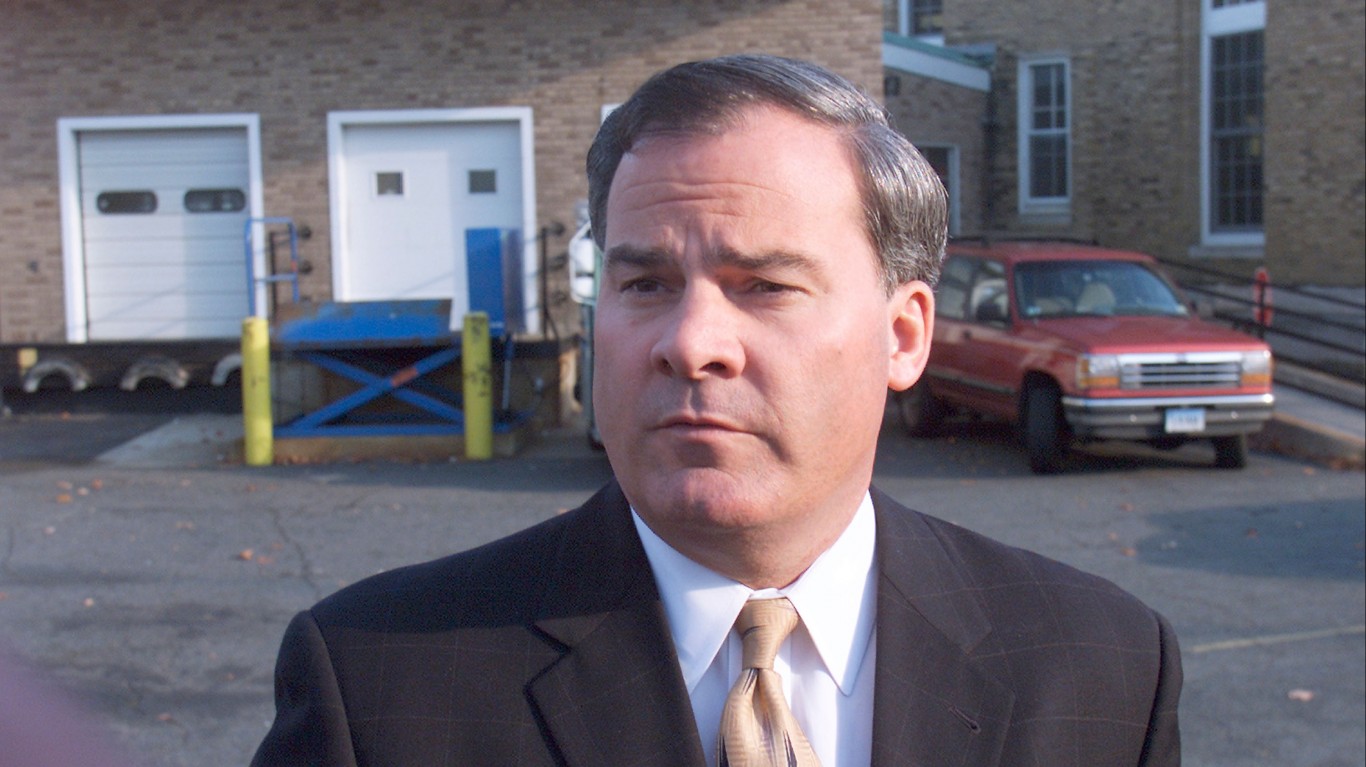
7. Connecticut
> Scandal: Ex-governor’s corruption
> Year: 2004
Former Gov. John Rowland was convicted of fraud and conspiracy for taking illegal payments in 2004. He was released after serving less than a year of his sentence. A decade later, he was imprisoned again on charges that he tried to conceal his role from political campaign overseers as a paid political consultant for several congressional campaigns. Rowland had been the youngest governor ever in Connecticut.
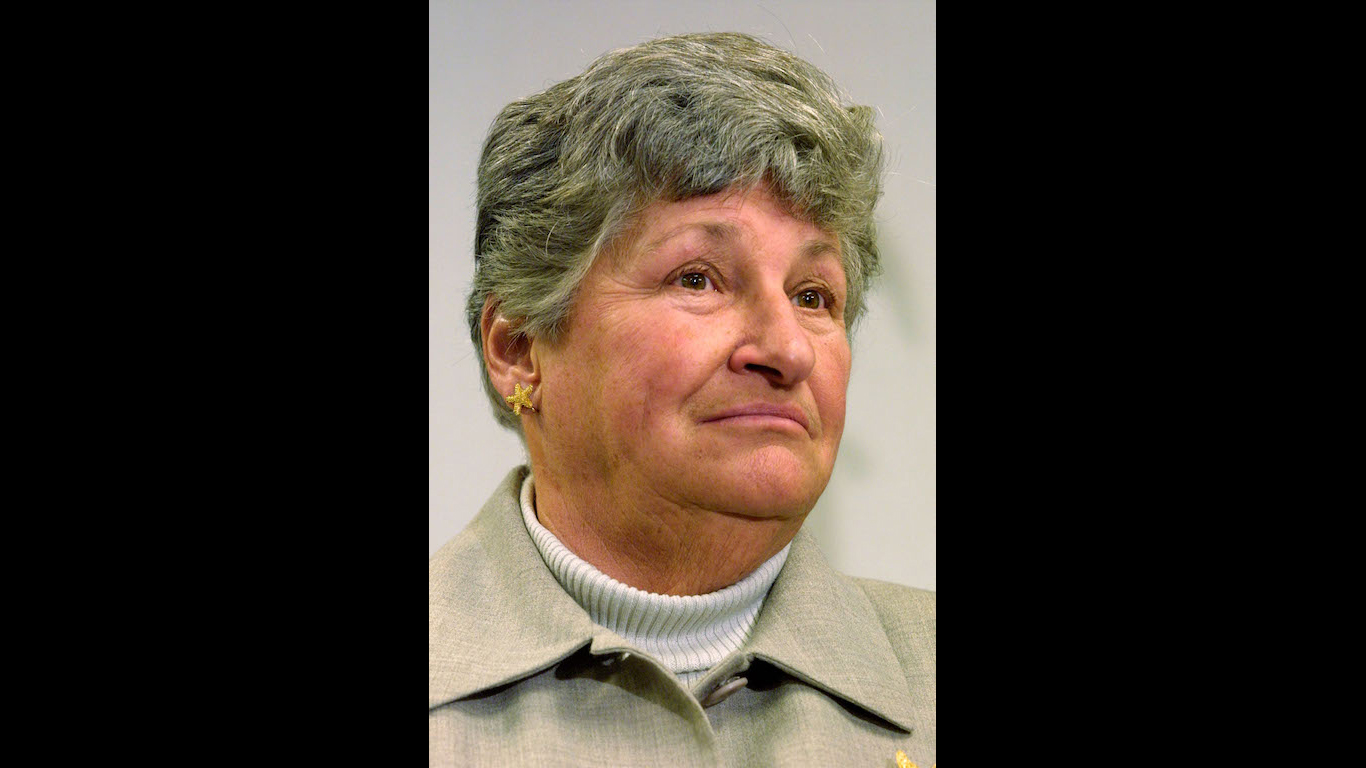
8. Delaware
> Scandal: Gov. Minner accused of taking improper gifts
> Year: 2006
Gov. Ruth Ann Minner was accused of taking improper gifts from a lobbyist in 2007. The governor took a private flight to Canada for a government leadership conference with a liquor company executive who failed to register as a lobbyist.
Minner did not report the flight in a disclosure filing and said later her cost of the flight did not top the $250 threshold for financial disclosure for state officials, though she never faced any official penalty. The liquor company executive, Christopher Tigani, eventually pleaded guilty to campaign finance violations.

9. Florida
> Scandal: Miami cops swipe cocaine
> Year: 1985
Few scandals undermined the public’s faith in law enforcement more than when police officers pocketed drugs instead of turning them over for evidence. In the summer of 1985, police supposedly raided a boat on the Miami River that was offloading cocaine reportedly worth $2 million. The drugs went missing, and an investigation led to a labyrinth of crooked cops who shook down drug dealers and took the money and drugs. Eventually, over a dozen police officers were convicted.
[in-text-ad-2]

10. Georgia
> Scandal: Cheating scandal involving principals and teachers
> Year: 2011
A wide-ranging test-cheating scandal in Atlanta undercut the integrity of educators. In 2011, about 180 teachers and principals in the Atlanta public school system cheated to boost student scores on standardized tests. It was one of the biggest cheating scandals involving educators in the nation’s history.
The Georgia Bureau of Investigation also uncovered a conspiracy to intimidate whistleblowers and conceal misdoing. Education observers cited the scandal as an example of politicians placing too much emphasis on students performing well on standardized tests.

11. Hawaii
> Scandal: Law enforcement couple frames own family
> Year: 2013
A Honolulu power couple are both heading to prison for a wide-ranging corruption scheme. Katherine Kealoha was a high-ranking prosecutor in the area, married to Honolulu police chief Louis Kealoha. The saga began when Katherine duped her grandmother into getting a reverse mortgage, netting her around $150,000 to spend on cars, gifts, and other luxury items. She also apparently had plans to defraud banks and drain trusts of children in the family. When her uncle Gerard Puana tried to sue Kealoha, she used her husband’s law enforcement status to try to frame Puana for theft to ruin his credibility.
The couple was indicted in 2017 and eventually pleaded guilty. Katherine blamed much of her impaired judgment on a prescription drug addiction. In late 2020, she was sentenced to 13 years in prison, while her now-estranged husband Louis was sentenced to seven years. Two other police officers were also convicted.
[in-text-ad]
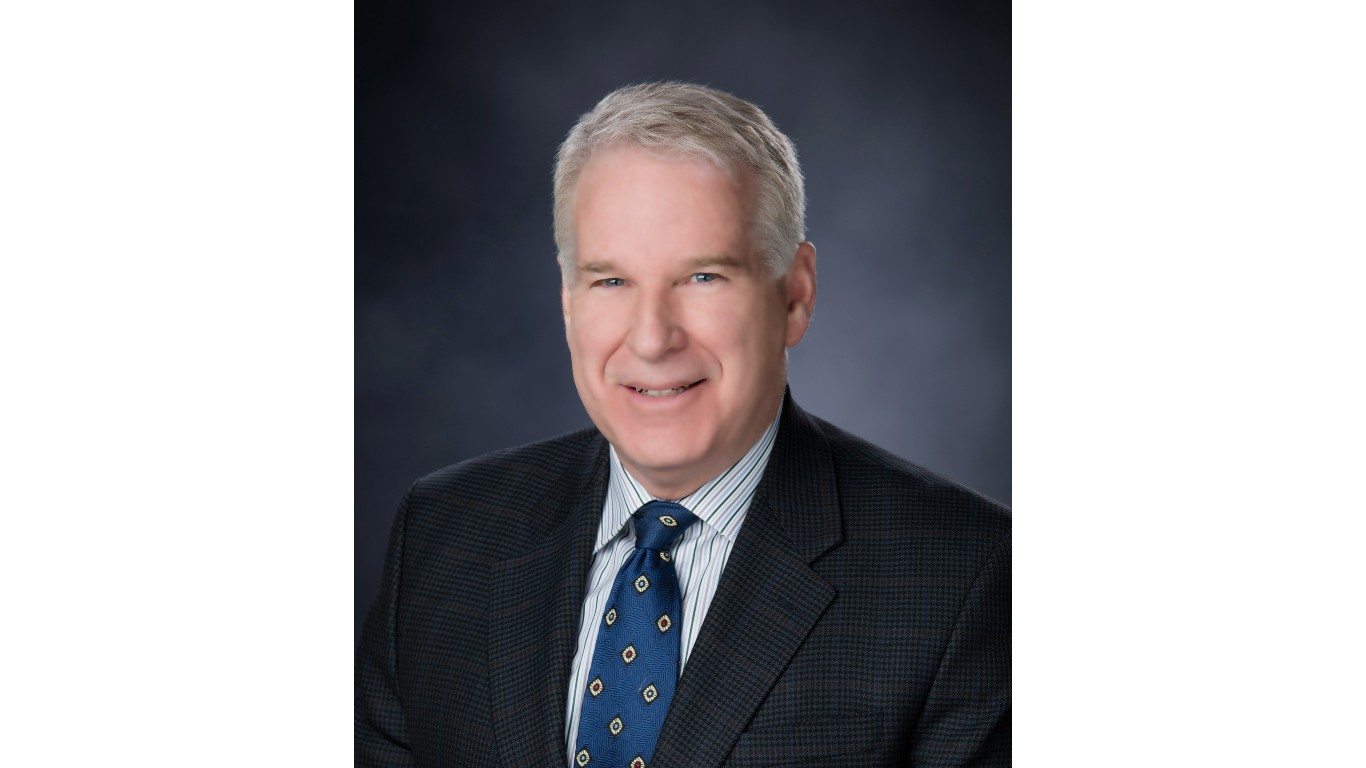
12. Idaho
> Scandal: State Rep. Hart ducks tax payment
> Year: 2013
Like a lot of people, Idaho state Rep. Phil Hart didn’t like to pay taxes. He challenged the constitutionality of federal taxes by refusing to pay them, beginning in 1996. Eventually, he owed more than $500,000 in state and federal taxes.
The Republican legislator’s defiance didn’t stop there. Hart also took timber from land owned by the state to build a home because he believed he was entitled to it as a citizen. After losing his challenge on the constitutionality of federal taxation, the feds eventually sold the property to pay for taxes he owed the government. Hart was thwarted in his bid for a fifth term when he lost a primary in 2012.

13. Illinois
> Scandal: Ex-Gov. Blagojevich guilty of misusing powers
> Year: 2008
Rod Blagojevich in 2011 was found guilty of misusing his powers as governor of Illinois, most famously for trying to sell the Senate seat left vacant when Barack Obama was elected president in 2008. Blagojevich was convicted on 17 corruption-related charges and removed from office in 2009. He received a 14-year prison sentence in 2011 but was released from prison early.
President Donald Trump — who had Blagojevich on his “Celebrity Apprentice” TV show before he was imprisoned — commuted Blagojevich’s sentence in 2020.
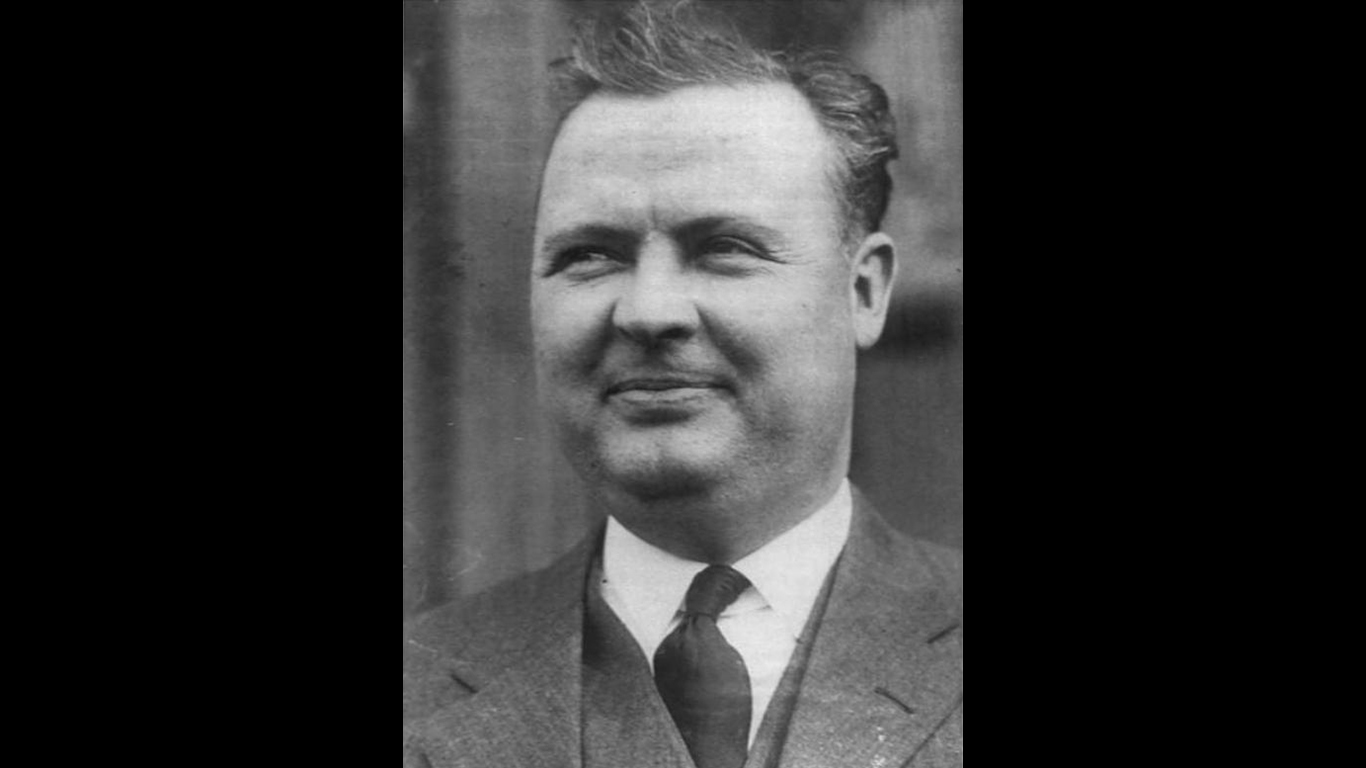
14. Indiana
> Scandal: Indiana politician rаpe/murder scandal
> Year: 1925
Indiana powerbroker and Ku Klux Klan leader D.C. Stephenson was charged with rаpe and murder in a sensational case in 1925. Stephenson was hoping Gov. Ed Jackson, whom he had helped elect, would grant him a pardon after he was convicted of second-degree murder of a woman who worked for the governor. When Stephenson didn’t get the pardon, he went public with his relationships with Jackson and other politicians. This led to the downfall of Jackson as well as Indianapolis Mayor John Duvall.
[in-text-ad-2]
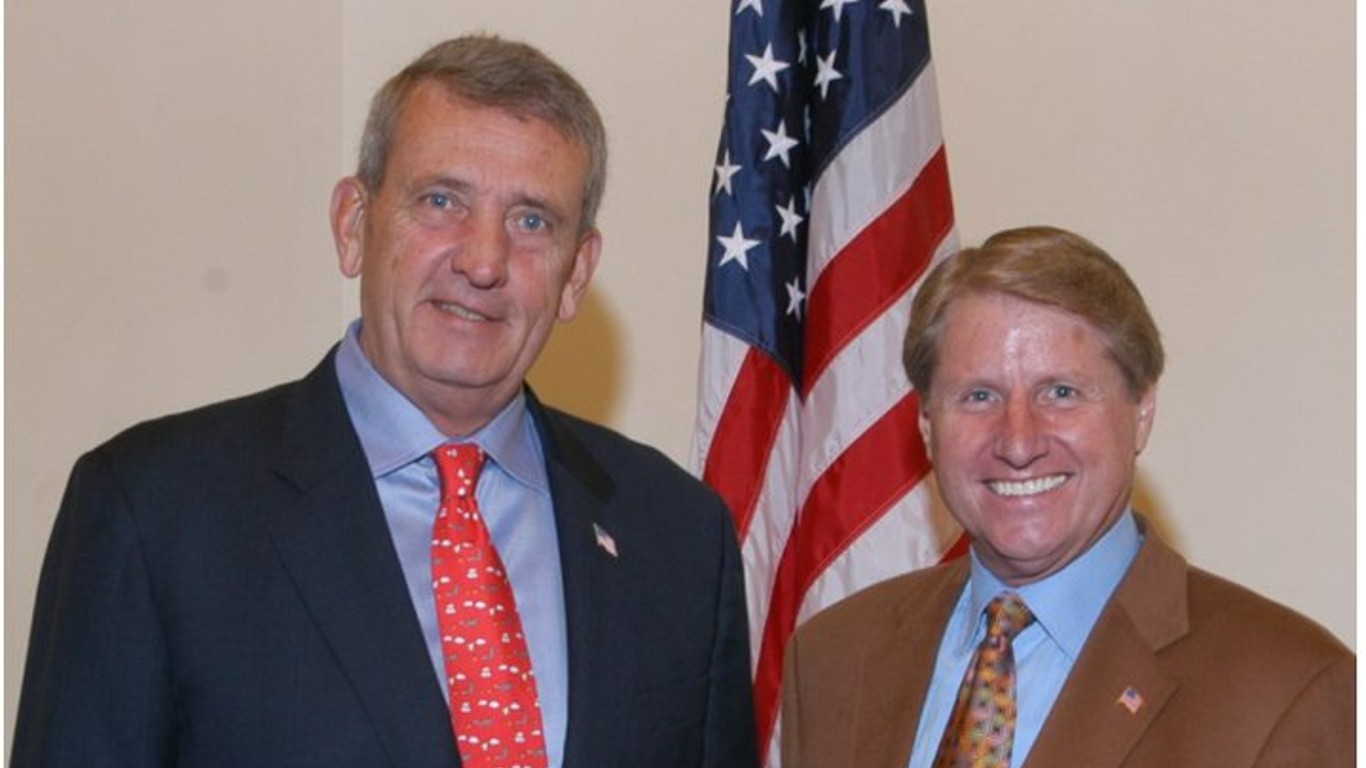
15. Iowa
> Scandal: Embezzlement scandal
> Year: 2013
Russell Wasendorf, the former chief executive of Peregrine Financial Group in Cedar Falls, received a 50-year jail term for embezzling $215 million from 13,000 clients. The 50-year term was the maximum allowed under the law. Wasendorf confessed to using client funds to keep his firm solvent, and he also blamed regulators for causing his business to fail.

16. Kansas
> Scandal: University of Kansas pay-to-play scandal
> Year: 2018
The University of Kansas has one of the most storied basketball programs in NCAA history. But the Jayhawks have played under a cloud of a looming investigation from the FBI that has shaken up the program for years. Kansas is facing charges of “multiple Level 1 violations and charges of lack of institutional control and head coach responsibility.”
This stems from accusations that representatives of apparel brand Adidas paid athletes to play basketball at Kansas, among other schools. A recruit was reportedly offered $100,000 by Adidas representatives to play for the Jayhawks. An Adidas employee and two other men were convicted of wire fraud in 2019 for orchestrating the payments.
[in-text-ad]
17. Kentucky
> Scandal: BOPTROT FBI sting
> Year: 1990
BOPTROT is the unwieldy name for an FBI sting operation that took place in the early 1990s in Kentucky. The operation targeted legislators for taking bribes from the operators of struggling harness tracks who were trying to compete against thoroughbred racetracks. The BOP in BOPTROT stands for the Business Organizations and Professions Committees in both houses of the Kentucky General Assembly that deal with horse-racing bills. TROT refers to the trots, another name for harness racing. What shocked people most about this scandal was that legislators could be bought for bribes as low as $400.
In the end, eight state senators and seven state representatives from both parties were either convicted or pleaded guilty to corruption-related charges — most notably, Democratic House Speaker Don Blandford.
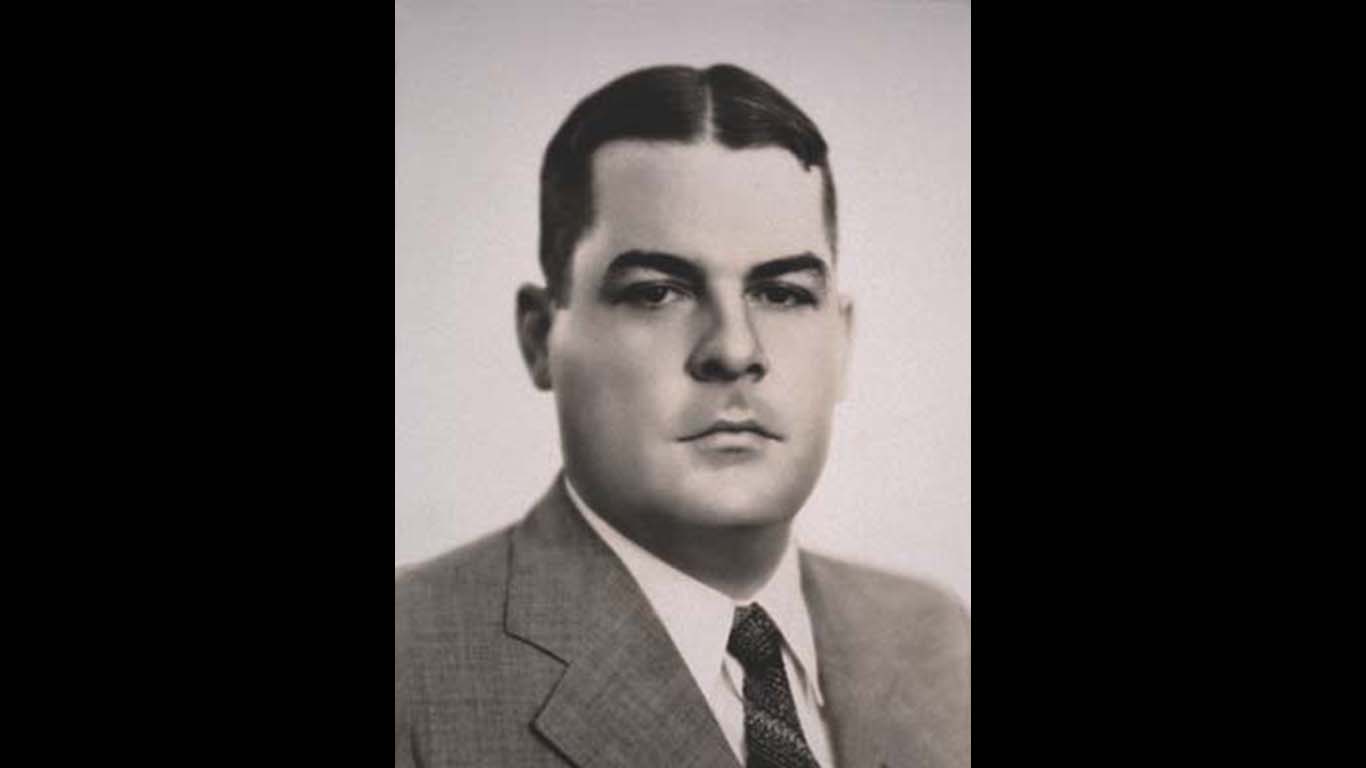
18. Louisiana
> Scandal: Louisiana officials bribery case
> Year: 1939
Louisiana has a colorful history of corruption, and the scandal involving Gov. Richard Leche is at the top of the list. Leche won the gubernatorial race in 1936 and tried to build on the legacy of charismatic governor and Sen. Huey Long by helping the poor, building infrastructure, and constructing hospitals. But he became embroiled in a scandal that ensnared hundreds of politicians and businessmen. Leche resigned and was convicted of taking kickbacks. He served five years in federal prison and was later pardoned by President Harry Truman.

19. Maine
> Scandal: Embezzlement scandal
> Year: 2011
The city of Newburgh, Maine, found in 2010 discrepancies in town financial records. The focus of the investigation soon turned to the town’s deputy clerk and treasurer, Cindy Dunton. Dunton embezzled just under $200,000 from 2006 to 2009, according to a forensic accountant who investigated the accusations of wrongdoing.
In 2011, Dunton pleaded guilty to a theft charge and received a five-year sentence, over three years of which was suspended. All in all, Dunton was ordered to spend 20 months in prison and pay over $250,000 in restitution.
[in-text-ad-2]

20. Maryland
> Scandal: Baltimore Mayor Pugh cooks the books
> Year: 2019
In 2019, former Mayor of Baltimore Catherine Pugh pled guilty in 2019 to corruption charges related to her children’s book, “Healthy Holly,” which promotes healthy eating habits and exercise for kids. Several charities, children’s groups and nonprofit organizations purchased thousands of copies of the book — but those copies never made it to their children, according to law enforcement officials. Instead, they were resold, netting Pugh
around $800,000.
Pugh then allegedly used the money to finance her mayoral run in 2016, writing checks to her campaign in other peoples’ names, as well as to refurbish her home. After the Baltimore Sun reported on her business dealings, federal officials raided her home and charged her with 11 corruption-related charges. She resigned her position soon after. In February 2020, Pugh was sentenced to three years in prison.

21. Massachusetts
> Scandal: Mass. mayor solicits marijuana bribes
> Year: 2018
In 2015, Jasiel Correia was considered a political wunderkind. At just 23, he was elected mayor of Fall River, Massachusetts — a town of over 88,000 people. In his first term, however, Correia was placed under FBI investigation for misusing funds from a business venture called SnoOwl, which aimed to function as a hybrid of social media and Yelp for local businesses. In 2018, Correia was arrested on nine counts of wire fraud, accused of spending hundreds of thousands of investor dollars on personal trips, jewelry, clothing, and more.
Correia was reelected in 2019 in a crowded field of five mayoral candidates. However, he was soon arrested again — this time for allegedly extorting bribes from marijuana businesses in the area. He reportedly demanded hundreds of thousands of dollars for licenses to operate, or even just to allow water to be turned on to the businesses. In May 2021, Correia was convicted on 21 of 24 federal counts stemming from both scandals.
[in-text-ad]

22. Michigan
> Scandal: Flint water crisis
> Year: 2014
The Flint water crisis broke in April 2014 and exposed leadership incompetence from the governor’s office to the city’s managers as well as supervisors at agencies tasked to oversee the city’s drinking water. The crisis began when financially strapped Flint switched its water source to the Flint River from the Detroit system to save money. However, the city failed to include anti-corrosives to the water, which resulted in a jump in the amount of lead in the water to very high and dangerous levels. Thousands of Flint residents were exposed, and at least a dozen area residents died from the associated Legionnaires’ disease outbreak.
In early 2021, nine state and local officials were indicted for their roles in the crisis, including former Gov. Rick Snyder. Charges included willful neglect, perjury, misconduct in office, obstruction of justice, and involuntary manslaughter. All nine have pleaded not guilty.
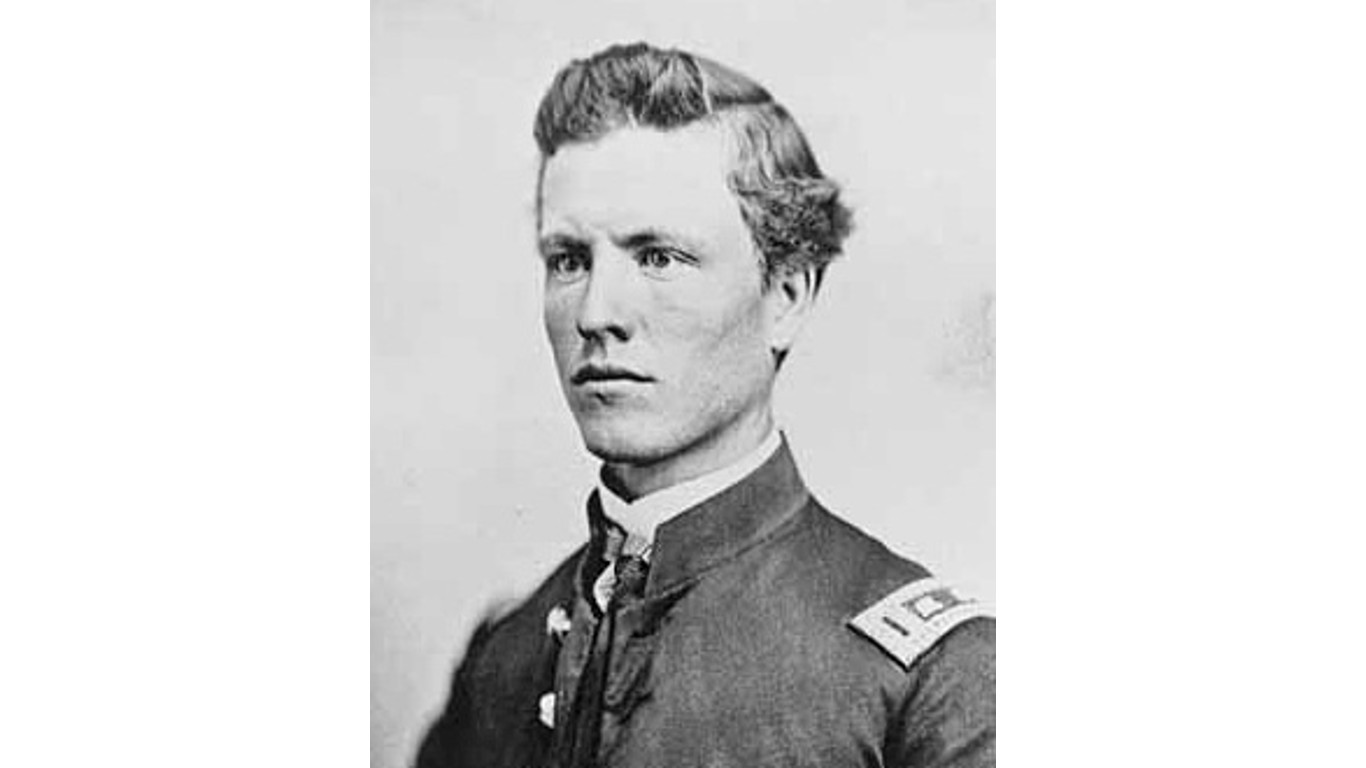
23. Minnesota
> Scandal: Rampant corruption in 1900s Minneapolis
> Year: 2009
The largest corruption scandal in Minnesota history dates back over a century, to Minneapolis’ longtime mayor, Albert Alonzo Ames. Though Ames had been mayor since 1876, his corruption seemed to peak in the 20th century. Ames made his brother police chief in 1901 and replaced about half of the Minneapolis Police Department with handpicked men he felt he could rely on.
Instead of cracking down on crime, these new officers profited from it. To keep their operations running, gambling dens and brothels bribed law enforcement, who kicked up some of their ill-gotten gains to city officials. The scheme fell apart when men who ran a rigged card game felt they had been double-crossed by Ames’ men and admitted to the schemes. Though he was indicted on nine counts and initially convicted on several of them, Ames appealed to the state Supreme Court and had his verdict overturned. He had several mistrials and never served any prison time.

24. Mississippi
> Scandal: Public servants accused of stealing from the needy
> Year: 2020
Mississippi’s largest public corruption scandal is also its most recent. In early 2020, six people were charged with a number of crimes like embezzlement and fraud, following accusations that they siphoned millions of dollars of public funds away from needy families for their own personal use.
The scheme was allegedly carried out by former state public servants like the head of the Mississippi Department of Human Services John Davis as well as others who worked for the DHS and Mississippi Community Education Center. Prosecutors say the group used “a variety of business entities and schemes” to transfer funds set aside for the Temporary Assistance for Needy Families program to their own pockets from 2017 to 2020. The case is ongoing and, in March 2021, Nancy New and her son Zachary New pleaded not guilty to 17 counts of fraud, conspiracy, identity theft, and money laundering.
[in-text-ad-2]
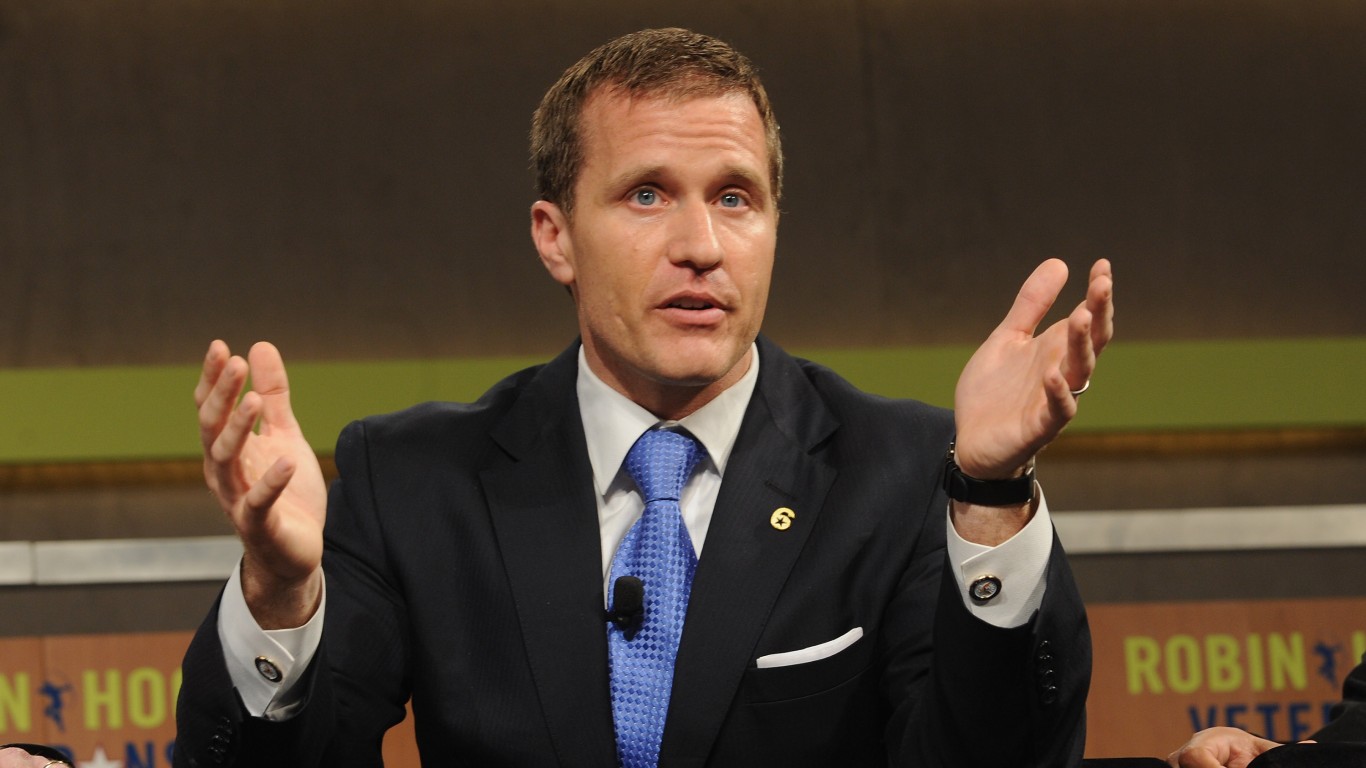
25. Missouri
> Scandal: Gov. Greitens simultaneous scandals
> Year: 2018
Former Missouri Gov. Eric Greitens, who was considered one of the rising stars in the Republican Party, resigned in disgrace in 2018 after becoming governor just two years earlier. He was indicted on a felony charge of invasion of privacy after being accused of surreptitiously taking photos of a woman with whom he was having an affair and of threatening to publicly reveal the photos to try and keep her silent. Those charges were eventually dropped.
Greitens simultaneously faced campaign finance probes over allegations that he used a veterans charity donor list to fundraise from and that he had dark money groups funding his push for governor. His campaign was fined $178,000 by the Missouri Ethics Commission, which said it did not find Greitens personally knew about the dark money. In March 2021, Greitens announced he would run for senate, seeking to replace Sen. Roy Blunt, who is not seeking reelection in 2022. Greitens lost in the primary.
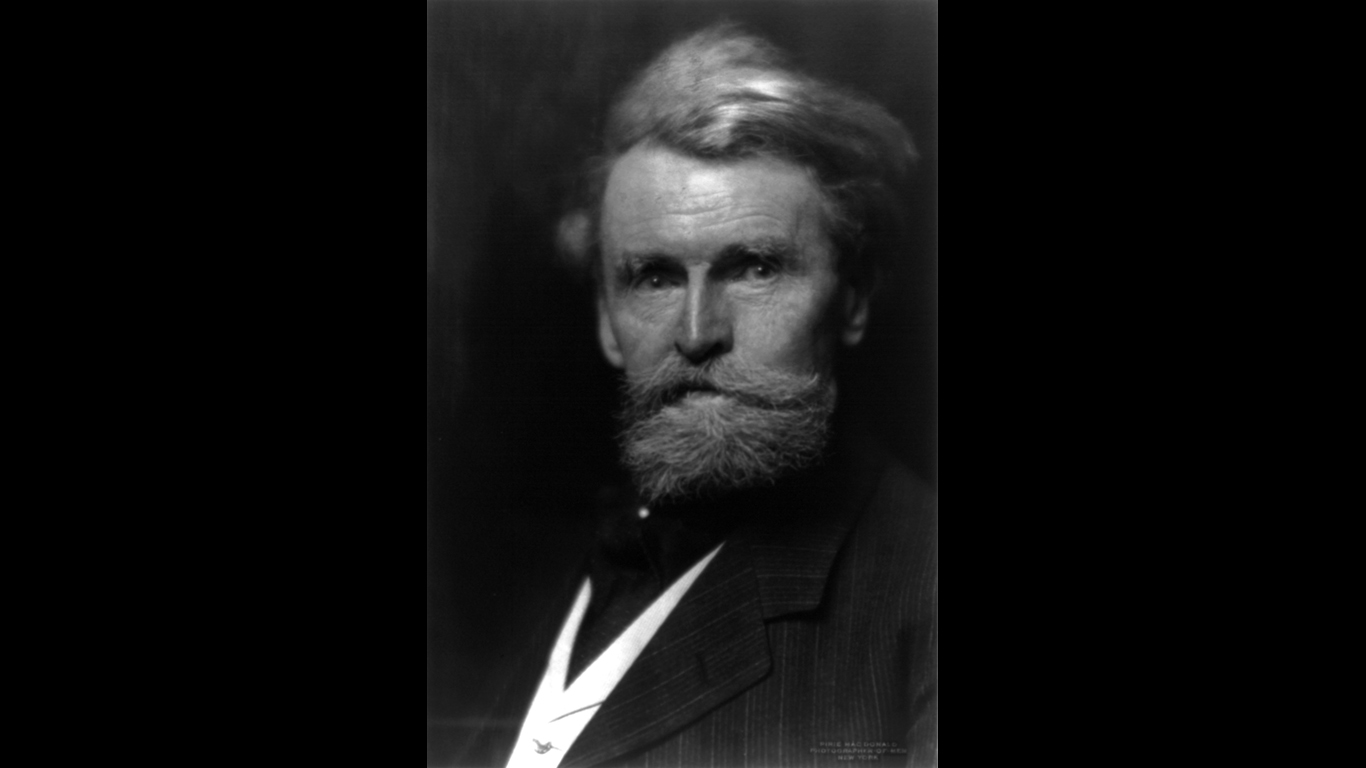
26. Montana
> Scandal: Clark bribes his way to the Senate
> Year: 1900
The Wild West has had its share of corruption scandals, and this might be the most famous one in Montana. William A. Clark made a fortune in copper, but he really wanted to be a senator, and he bribed his way to win a Senate seat.
On his first day in the Senate, his opponents filed a petition challenging the legitimacy of the election. That prompted a Senate investigation that discovered the stunning amount of bribes Clark dispensed to win the seat. In order to get votes, Clark paid off people’s debts and mortgages and brazenly handed out cash in envelopes to legislators. Before the Senate could vote on whether Clark should retain his seat, he resigned.
[in-text-ad]

27. Nebraska
> Scandal: Official charged with looting credit union
> Year: 1990
One of the more lurid scandals in Nebraska’s history involves a failed credit union in Omaha. Lawrence E. King was the manager of the Franklin Community Federal Credit Union that failed in 1988, and he was convicted of embezzling $38 million. King reportedly lived lavishly, spending thousands on limousines, flowers, homes, and more. He was eventually indicted on 40 counts, including fraud, embezzlement, and conspiracy. King was sent to prison in 1991 for his role in the failure of the institution, spending a decade in prison.

28. Nevada
> Scandal: FBI sting nets politicians on bribery charges
> Year: 1982
The FBI conducted an 18-month political corruption sting titled Operation Yobo that yielded bribery convictions of two state senators and two county commissioners. The operation was named after the FBI agent in charge, Joe Yablonsky. The four politicians were caught taking bribes from undercover agents who posed as business owners who wanted to set up land deals across the state.

29. New Hampshire
> Scandal: Phillips Exeter Academy sex scandal
> Year: 2016
A scandal involving sexual misconduct over several decades at the prestigious Phillips Exeter Academy in Exeter, New Hampshire, became a Senate campaign issue in 2016. That’s because Tom Hassan, husband of Senator and former New Hampshire Gov. Maggie Hassan, was headmaster at the school until he retired in 2015 and had worked at Phillips Exeter since 1989. The Boston Globe had published stories in the spring of 2016 that the school covered up sexual abuse of female students by a male instructor going back to the late 1970s.
Maggie Hassan won her senate race in 2016, but apologized for accepting a campaign contribution from the accused instructor in 2012 — the year after she claimed she “sensed something was wrong” when the teacher was removed from his job. Hassan maintains she was unaware of his misconduct.
[in-text-ad-2]

30. New Jersey
> Scandal: Bridgegate
> Year: 2013
In September 2013, two of the three lanes of the George Washington Bridge, going from Fort Lee, New Jersey, to New York City, were closed. This clogged the bridge and backed up traffic for hours. While the closings were initially explained by a traffic study, it soon was revealed that the closures were retaliation, as Fort Lee’s mayor backed off an endorsement for from Gov. Chris Christie’s reelection bid.
Christie’s deputy chief of staff Bridget Anne Kelly and Port Authority deputy executive director Bill Baroni were both indicted for misusing resources and violating the rights of Fort Lee’s citizens. They were convicted initially but the convictions were reversed by the U.S. Supreme Court, which ruled that the pair could not have violated federal laws because they were not seeking “to obtain money or property.” Port Authority political appointee David Wildstein had already pleaded guilty and was sentenced to probation. Though Christie was never personally implicated, the scandal helped sink his 2016 presidential run.
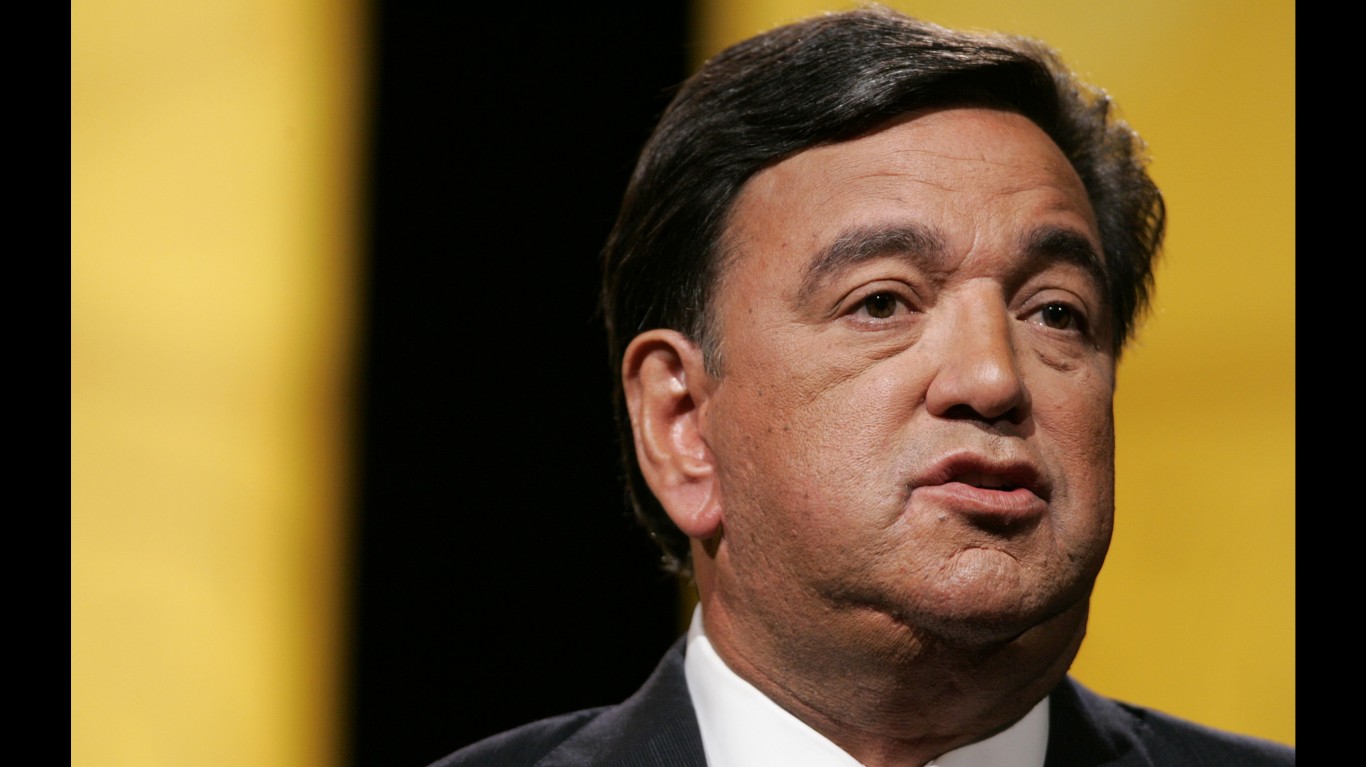
31. New Mexico
> Scandal: Gov. Richardson pay-for-play claims
> Year: 2008
Gov. Bill Richardson was a rising star in the Democratic Party. His bid for the presidency in 2008 failed, but the eventual victor, Barack Obama, wanted Richardson to be his secretary of commerce. Richardson, however, had to withdraw his nomination because of a federal grand jury probe into allegations of pay-to-play practices in his administration.
The investigation focused on a California company that had contributed to Richardson’s political action committees and had been awarded contracts to help fund construction of New Mexico’s highways. The investigation by the Department of Justice concluded without indictments.
[in-text-ad]
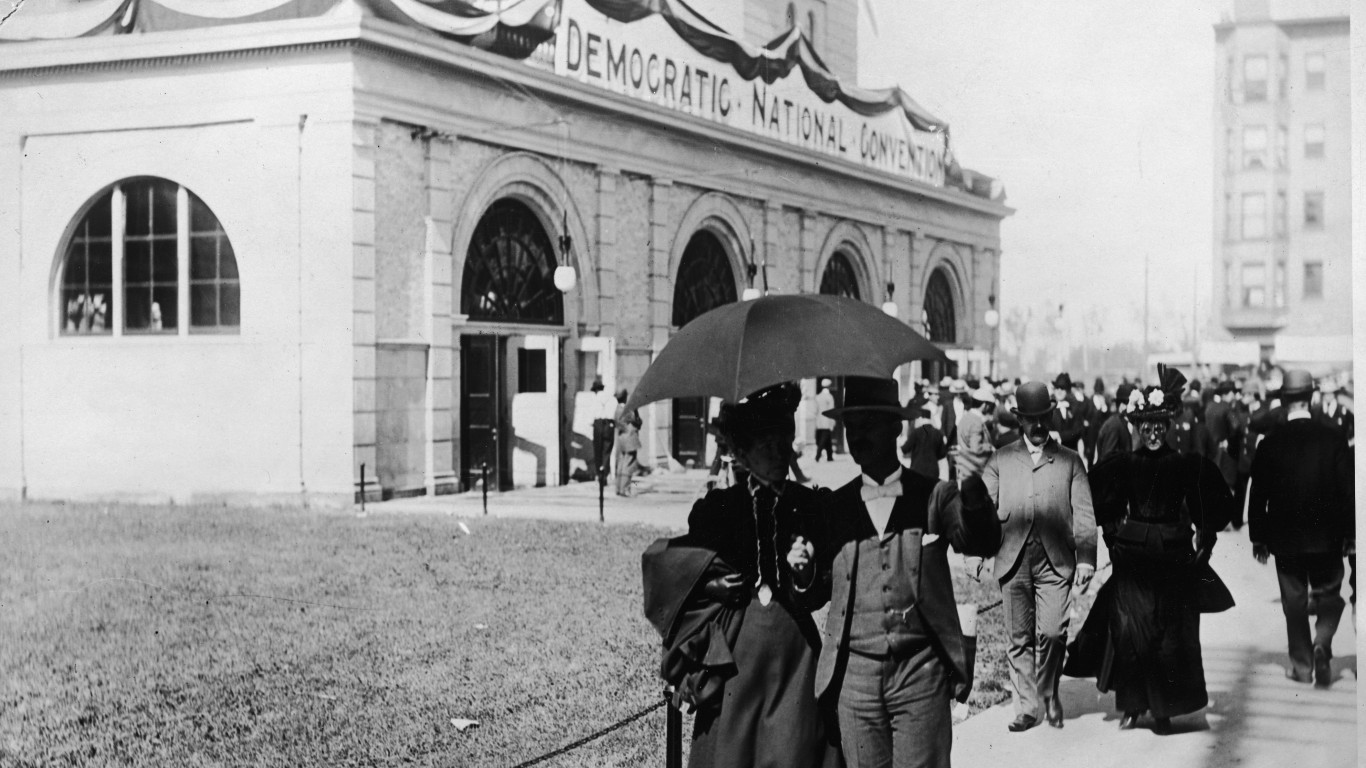
32. New York
> Scandal: Tammany Hall exposed
> Year: 1932
From the late 18th through the early 20th century, much of the political power in New York City flowed through Tammany Hall — a Democratic political machine that placed only the sufficiently loyal into power. Tammany Hall higher-ups aided members with health care and other bills in exchange for political support. The organization also had deep mob ties and frequently bribed officials. Ultimately, the organization was undone by Samuel Seabury, an anti-Tammany Democrat who, throughout the 1920s and 1930s, untangled a vast web of corruption in the city’s political system.
At the behest of then New York Gov. Franklin D. Roosevelt, Seabury and his commission uncovered financial fraud leading all the way up to New York City Mayor James J. Walker, who stepped down from his post in 1932 after Seabury discovered he had accepted roughly $1 million in bribes. In the wake of the scandal, most of Tammany Hall’s members left the organization, marking the beginning of the end of the political machine.
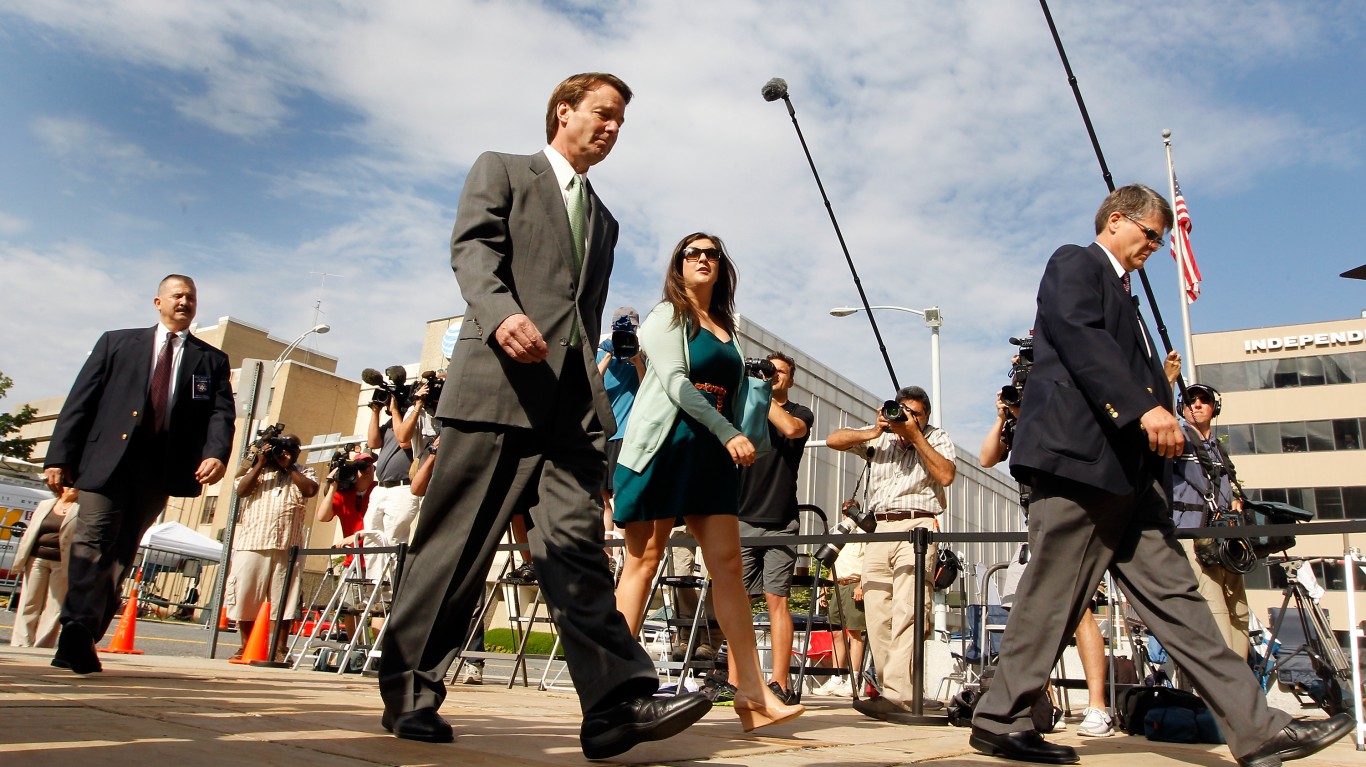
33. North Carolina
> Scandal: John Edwards scandal
> Year: 2008
John Edwards, the son of a textile worker, seemed to have the goods as a presidential candidate in 2008. He was telegenic and articulate, and his “Two Americas” speech at the Democratic National Convention in 2004 about the economic bifurcation of American society put him on the national stage. But his bid to become president was scuttled when the National Enquirer revealed that he had an affair with Rielle Hunter, a documentary filmmaker for his campaign.
Edwards repeatedly denied his relationship with Hunter until he finally confessed to the affair. What made the scandal worse was that Edwards’ wife was dying of cancer at the time of the affair. Edwards was later indicted on charges he used campaign funds to hide the affair from the public. He was found not guilty on one charge and the judge declared a mistrial on five other charges.
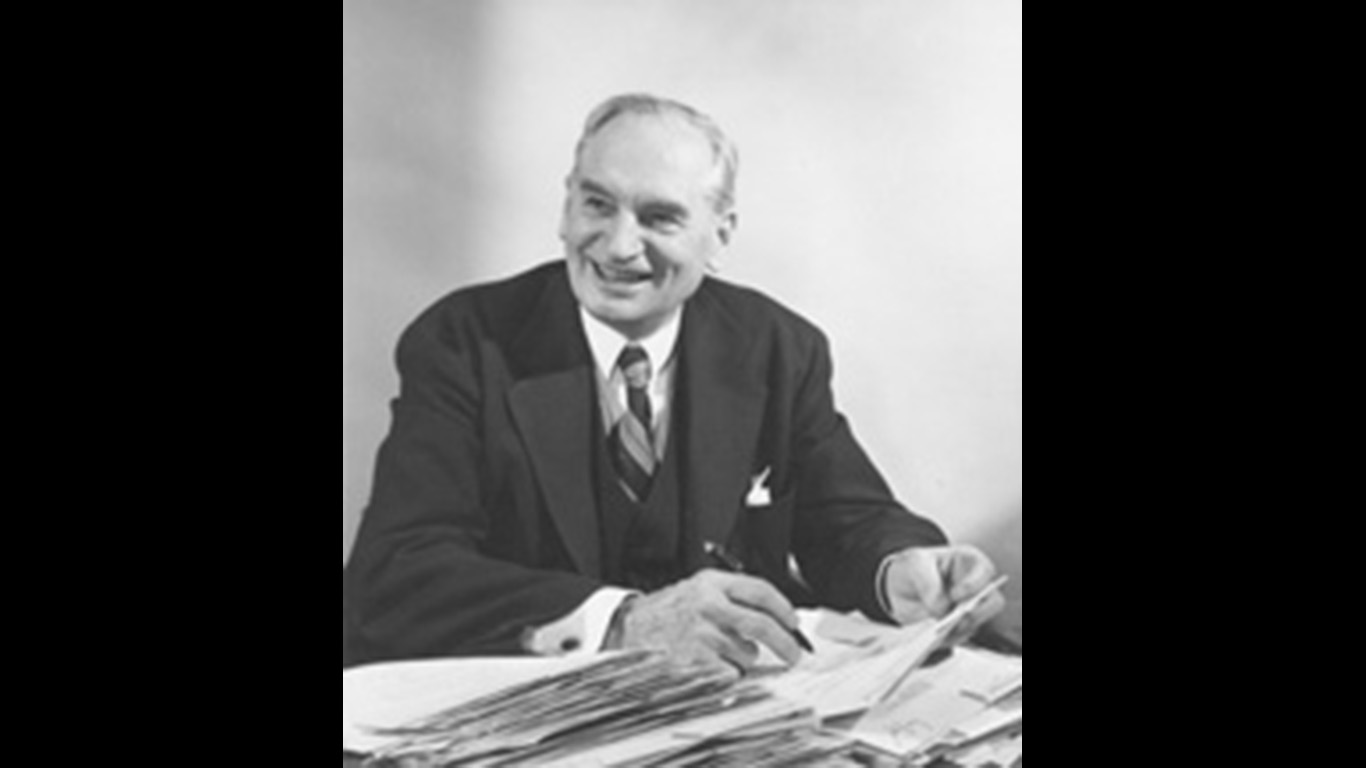
34. North Dakota
> Scandal: Gov. Langer corruption
> Year: 1934
North Dakota Gov. William Langer became famous in 1934 for standing up to the federal government, which had convicted him on charges of corruption. The corruption charges stemmed from reports that the Republican governor had required state employees to donate money to his party.
In defiance of the U.S. government, Langer refused to step down, declared North Dakota independent, and barricaded himself in the governor’s mansion. Sympathetic farmers marched on the state capital of Bismarck in support of him. Langer was eventually exonerated. Nicknamed “Wild Bill,” he remained popular in North Dakota and was reelected governor. Later he was elected to the U.S. Senate and served there until his death in 1959.
[in-text-ad-2]

35. Ohio
> Scandal: Ex-House speaker expelled; charged with bribery
> Year: 2020
In July 2020, then-Ohio House Speaker Larry Householder was arrested on his farm and charged with conspiracy related to a $60 million bribery scheme. Prosecutors said an unnamed company (reportedly FirstEnergy) funneled $60 million over three years to a charity organization called Generation Now, which they say was controlled by Householder. It is also alleged members of the organization used the money for their own benefit and to further Householder’s bid for speaker, which he won in 2019. In return, Householder reportedly helped pass a bill bailing out nuclear power companies and slashing subsidies for renewable energy companies within six months of becoming speaker. Another former politician, an advisor, and two lobbyists were also charged.
In June 2021, Householder was expelled from the state House in light of the charges by a 75-21 vote. This marked the first time in over 150 years an Ohio lawmaker was expelled from their post.

36. Oklahoma
> Scandal: County commissioners guilty in kickback scandal
> Year: 1981
A massive kickback scandal netted about 220 county commissioners in 1981 and at the time was called the biggest kickback scheme in U.S. history. The corruption in deals on gravel and bogus purchases of timber that were ordered for state construction projects, but never delivered. The FBI got several lumber suppliers to tape meetings with county commissioners to build a case against them. Most of the people charged in the kickback scheme pled guilty to mail fraud and obstructing the Internal Revenue Service.
[in-text-ad]

37. Oregon
> Scandal: Oregon prison food scandal
> Year: 2000
In the early 21st century, inmates in Oregon’s Correction Department were served expired, mispacked, or improperly labeled food. Prosecutors say this was because Oregon’s prison food buyer Farhad “Fred” Monem accepted bribes from vendors to buy the distressed food items and provide it to inmates. Court records indicate Monem took $1.2 million in kickbacks from five different food vendors from 2000 to 2006.
Monem was charged with 20 related counts, including fraud, bribery, money laundering, conspiracy, and more. He was in the process of negotiating a plea deal in 2007, when he fled to Iran. His wife, Karen Monem, pleaded guilty to a role in the scheme and received a one-year prison sentence. Farhad Monem is still wanted by the FBI.

38. Pennsylvania
> Scandal: Sandusky scandal at Penn State
> Year: 2011
The scandal involving Penn State University assistant football coach Jerry Sandusky sent shockwaves across the nation. The longtime defensive coordinator was arrested for dozens of child sexual abuse charges in 2011. It led to the downfall in November 2011 of university President Graham Spanier and the firing of Coach Joe Paterno, the long-time coach of the Nittany Lions and the symbol of rectitude in college sports. Paterno would pass away two months later.
In 2012, Sandusky was found guilty of 45 counts of child sexual abuse and was sentenced for a term of 30 to 60 years. In 2016, a new court filing alleged that Paterno and other coaches had known Sandusky was abusing children for decades.
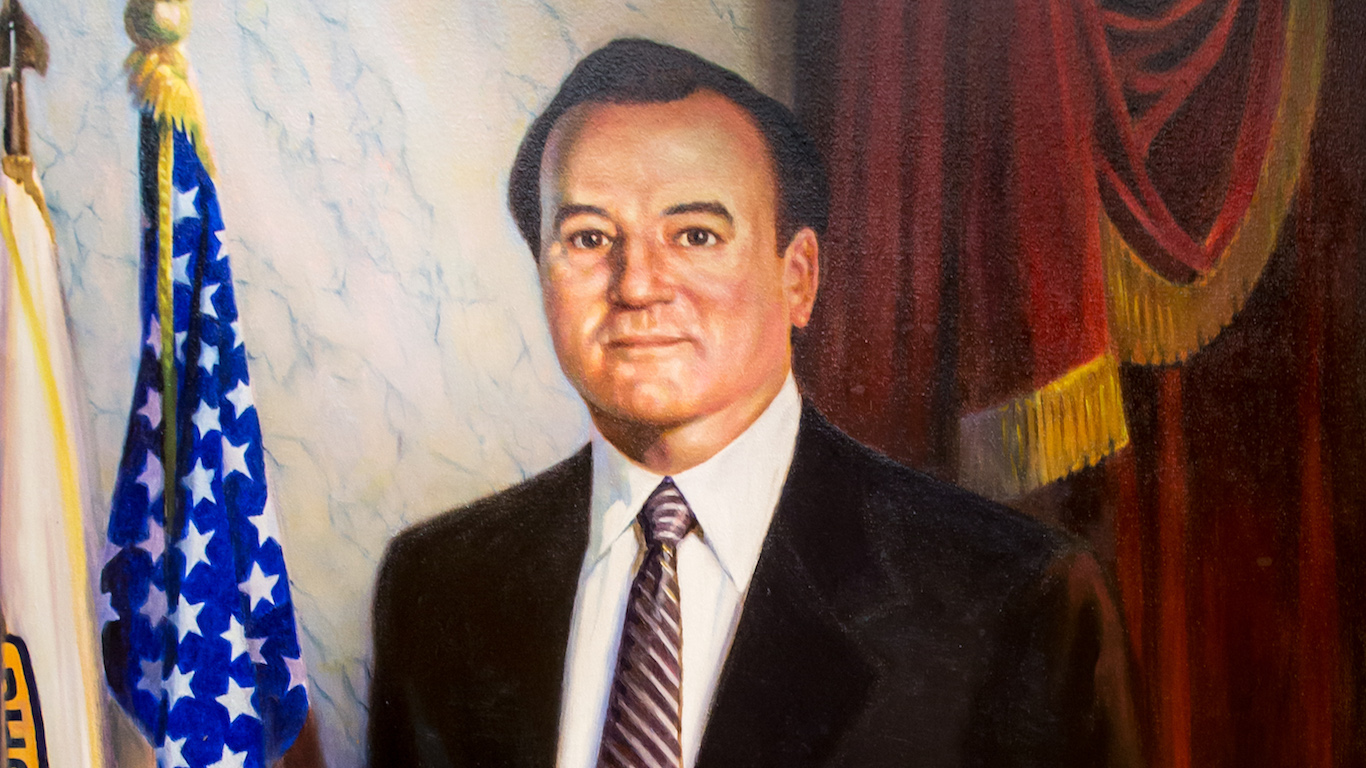
39. Rhode Island
> Scandal: Ex-Gov. DiPrete imprisoned for bribery
> Year: 1998
Rhode Island is a state with a legacy of politicians tainted by corruption, including colorful characters like the twice-convicted former Providence Mayor Vincent A. “Buddy” Cianci Jr. One of its more regrettable episodes involved its governor.
Edward DiPrete became the first Rhode Island governor to serve jail time after pleading guilty to multiple charges of corruption in 1998. He pled guilty to 18 counts of racketeering, extortion, and bribery and served just over 11 months in prison. Before the scandal, DiPrete had served three two-year terms as governor, ending in 1991.
[in-text-ad-2]

40. South Carolina
> Scandal: Operation Lost Trust
> Year: 1990
Operation Lost Trust was a major political corruption investigation conducted by the FBI in South Carolina. After a more than year-long investigation, over a dozen people were convicted of corruption, among them legislators from the state House Ethics Committee and lobbyists. During the trials, lawmakers were seen on surveillance tapes taking money to support a gambling bill. The money had been supplied by a lobbyist who had been turned by the FBI. After the sting, South Carolina passed stricter ethics rules for its legislators.

41. South Dakota
> Scandal: GEAR-UP program scandal
> Year: 2015
A scandal in South Dakota apparently led to the deaths of six people in one family, including the leading figure in the scandal. The episode centered around GEAR-UP, a federally funded program intended to inform lower-income students about higher education choices.
Scott Westerhuis and his wife were business managers at Mid-Central Educational Cooperative, which had financial control of the GEAR-UP program. Westerhuis, who used third-party organizations to access GEAR-UP’s bank account to pay Mid-Central employees, eventually looted $1.4 million from the organization. The state Department of Education canceled Mid-Central’s contract with GEAR-UP. Apparently facing financial pressure, Westerhuis shot and killed his family, burned his house down, and then took his own life.
[in-text-ad]
42. Tennessee
> Scandal: Operation Tennessee Waltz
> Year: 2005
The FBI launched an investigation into claims of corruption in Tennessee in 2002. Operation Tennessee Waltz led to the arrest of five former lawmakers who collected money in exchange for backing legislation that would benefit a recycling company called E-Cycle Management.
E-Cycle, though, was a bogus company set up by the FBI that recorded hours of video of lawmakers getting plied with liquor and receiving cash from undercover agents. The operation led to stricter reporting requirements for lobbyists and stringent disclosure standards for lawmakers about their sources of income.
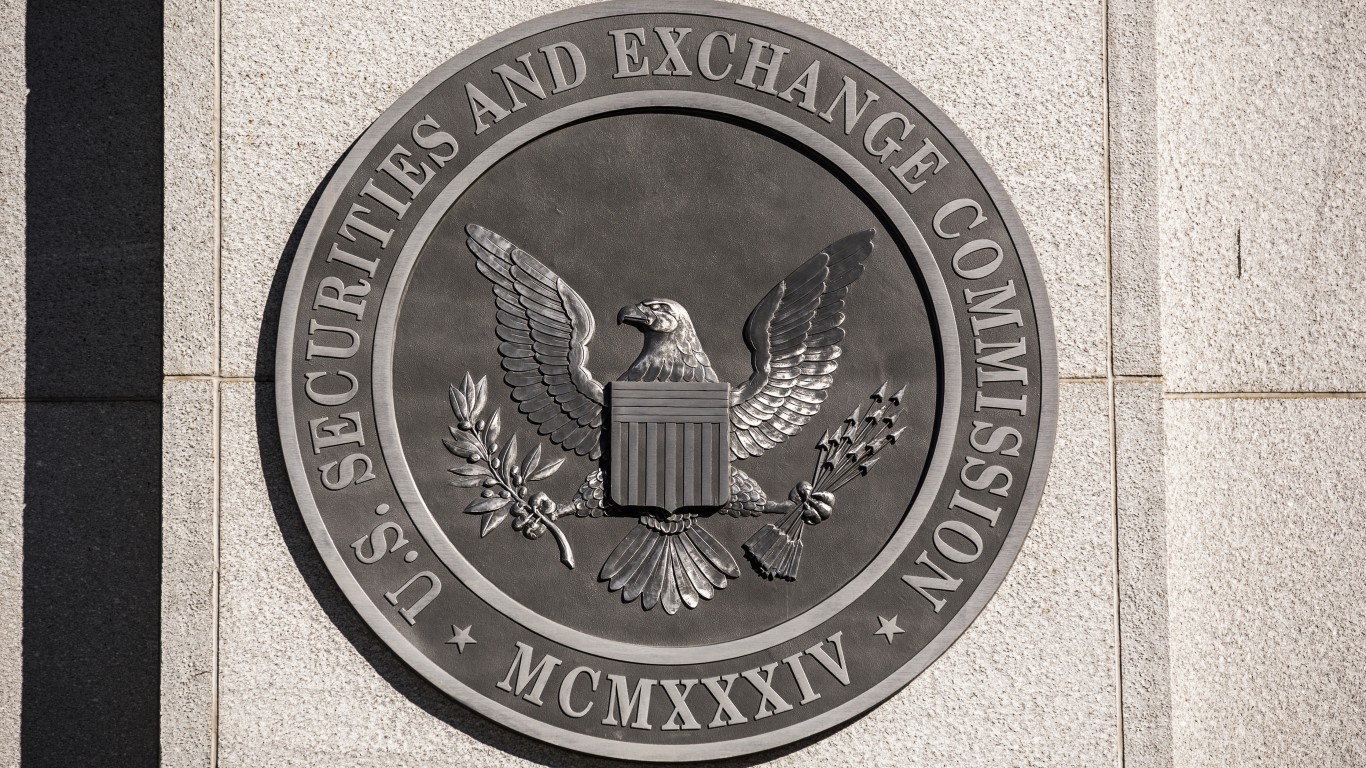
43. Texas
> Scandal: Sharpstown stock fraud scandal
> Year: 1969
In 1969, Houston developer and businessman Frank Sharp sought to get a bill pushed through in the Texas legislative session that would benefit his banking business. In order to do this, he offered a number of politicians and power players $600,000 in loans from his bank in order to buy stock in another one of his businesses, National Life Insurance. This would inflate its price, and they could then sell the stock at a higher value.
The Securities and Exchange Commission noticed the dealings and launched an investigation.
The governor, lieutenant governor, Texas house speaker, the Texas Democratic chair, the former state insurance commissioner and the former state attorney general were all implicated. The speaker and two associates were convicted, and all others involved saw their political careers come to a screeching halt.
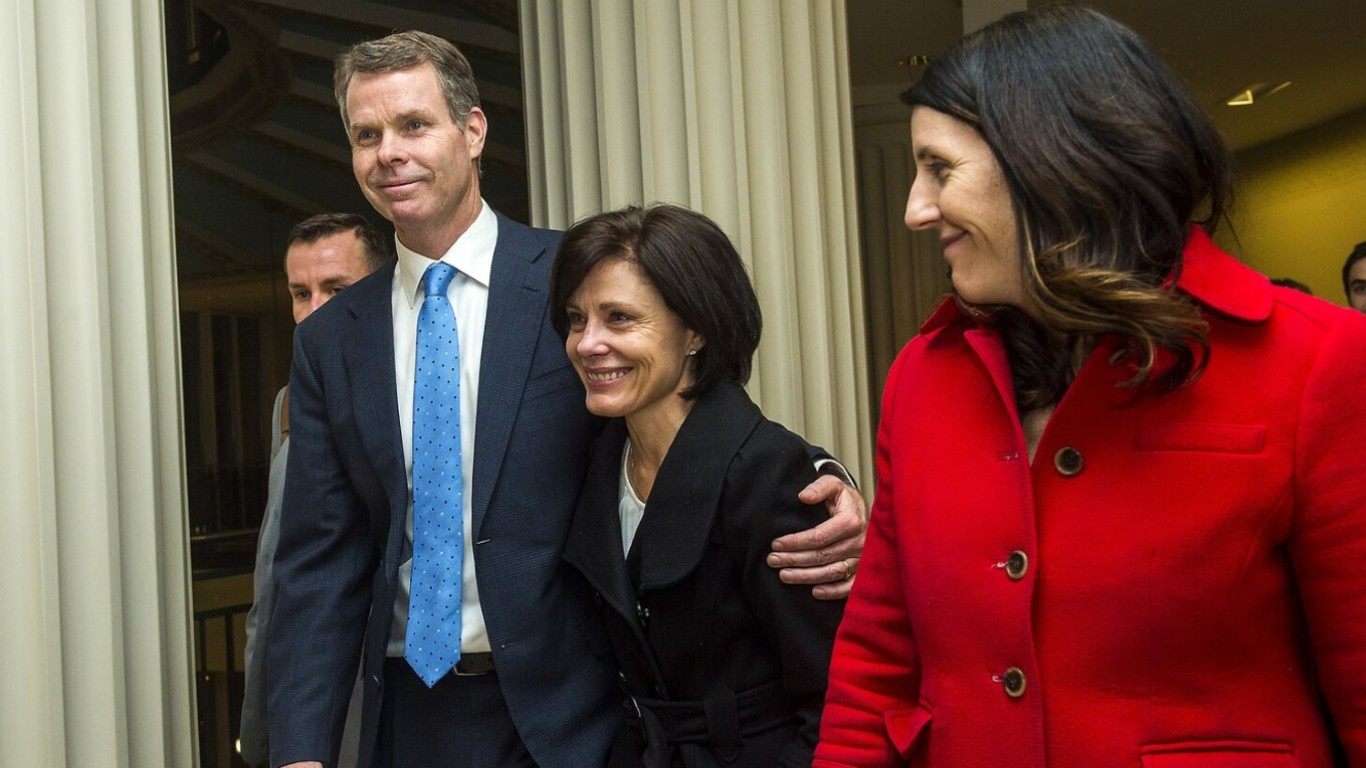
44. Utah
> Scandal: Attorney general in bribery scheme
> Year: 2017
Former Utah Attorney General John Swallow was charged with eight felony counts in addition to a misdemeanor in 2013. The charges ranged from accepting and requesting bribes to obstructing justice in the courtroom. Swallow was accused of trying to bribe then-Sen. Harry Reid into helping a friend of his avoid federal investigations into his payday lending business
At the time, the charges shook the state, as another former AG, Mark Shurtleff, was charged with similar crimes. Charges against Shurtleff were dropped in 2016. In spite of a House report that claimed Swallow covered up evidence, he was eventually acquitted of all charges in 2017. He received $1.5 million in compensation from the state for his legal expenses in 2019.
[in-text-ad-2]

45. Vermont
> Scandal: EB-5 investment for visa program scandal
> Year: 2017
In 2017, a program created to stimulate the economy through investment by immigrant entrepreneurs who could eventually get green cards was scrapped after two developers in the state were accused of committing fraud. Ariel Quiros and Bill Stenger were accused of misusing $200 million of the $350 million raised from immigrant investors for several projects through the visa program.
This mass amount of money was supposed to fund three different projects. By 2016, the 400 investors in the various unfinished projects had yet to receive their respective green cards. In 2019, Quiros pleaded guilty to fraud charges.
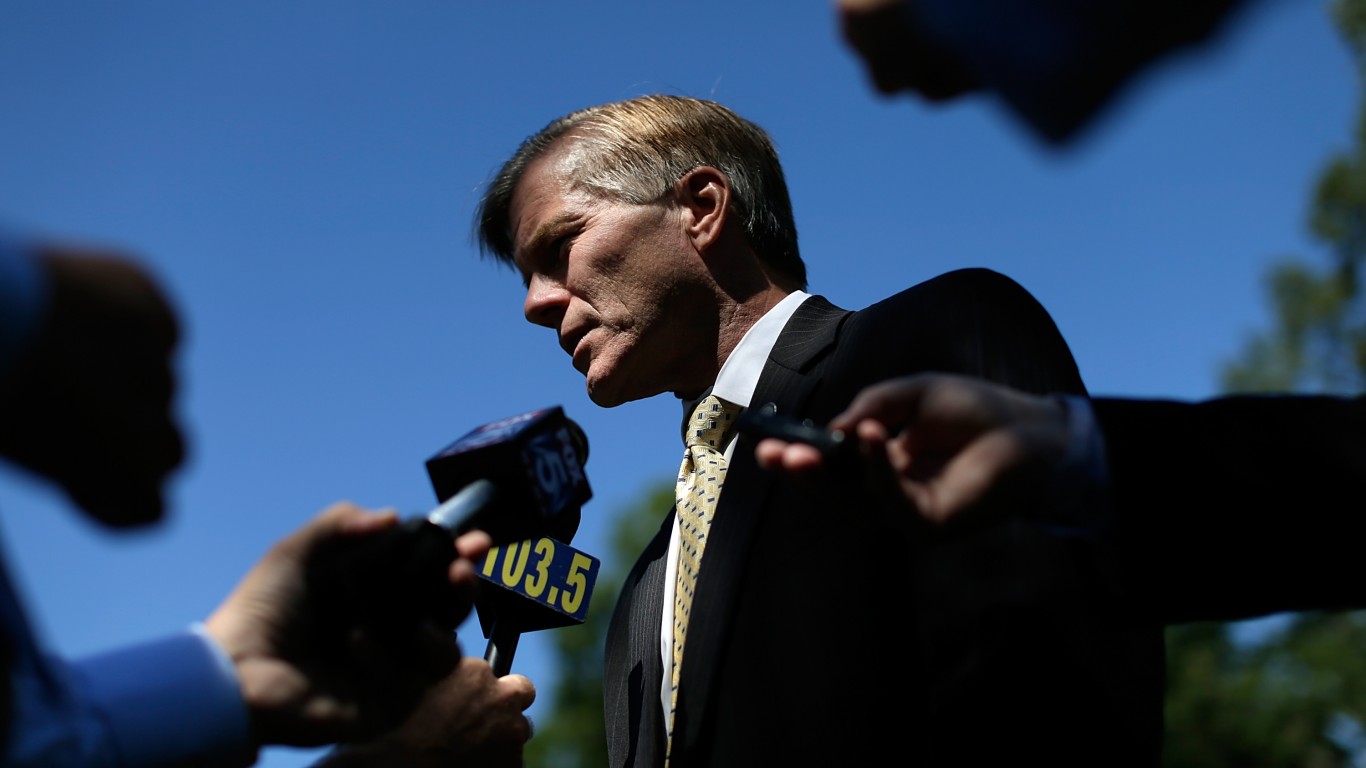
46. Virginia
> Scandal: Ex-Gov. McDonnell convicted of taking bribes
> Year: 2014
One of the most well-liked Virginia governors of all time, Bob McDonnell, was indicted for accepting various bribes from a local businessman. Over the years, McDonnell and his wife were accused of accepting $177,000 in different forms, from personal loans to gifts, including golf equipment, designer clothes, and vacations just to name a few. The U.S. Supreme Court ended up overturning the ruling against him, but McDonnell accumulated $27 million in legal bills.
[in-text-ad]

47. Washington
> Scandal: Sen. Adams sexual misconduct
> Year: 1992
Former Washington Sen. Brock Adams, also referred to as “Golden Boy,” dropped his bid for reelection as senator in 1992 after the media revealed accusations of sexual harassment against him.
The Seattle Times published an article claiming he had molested and sexually harassed eight women. Other allegations included those from former House aide Kari Tupper who said she was drugged and allegedly sexually assaulted by Adams five years prior, but the U.S. Attorney declined to prosecute because of a lack of physical evidence.

48. West Virginia
> Scandal: Social Security fraud
> Year: 2013
West Virginia’s Social Security office may have earned a bad reputation in 2013, but the corruption had been going on for several years prior. An investigation found that disability attorney Eric Conn was working with a judge and several doctors to reverse benefit denials for hundreds of applicants in Kentucky and West Virginia. Because lawyers can collect 25% — and up to $6,000 — of benefits on disability cases, Conn, the judge, and several doctors made a massive profit from convincing the federal government to award benefits to about 1,800 people. All told, his scheme aimed to defraud the Social Security Administration of over half a billion dollars.
Conn was initially sentenced to 12 years in prison and ordered to pay $72.5 million in restitution. He attempted to flee to Honduras but was apprehended and given an additional 15 year sentence.

49. Wisconsin
> Scandal: Ex-Milwaukee mayor sex scandal
> Year: 2002
Instead of spending money on another election, four-term mayor of Milwaukee, John Norquist, opted to spend his campaign funds elsewhere — specifically on a $375,000 settlement with an aide who repeatedly felt pressured by Norquist to have sexual relations with him. Marilyn Figueroa, who accused Norquist of sexual harassment, said the former mayor threatened to withhold funds for community organizations she supported if she rejected his advances.
[in-text-ad-2]
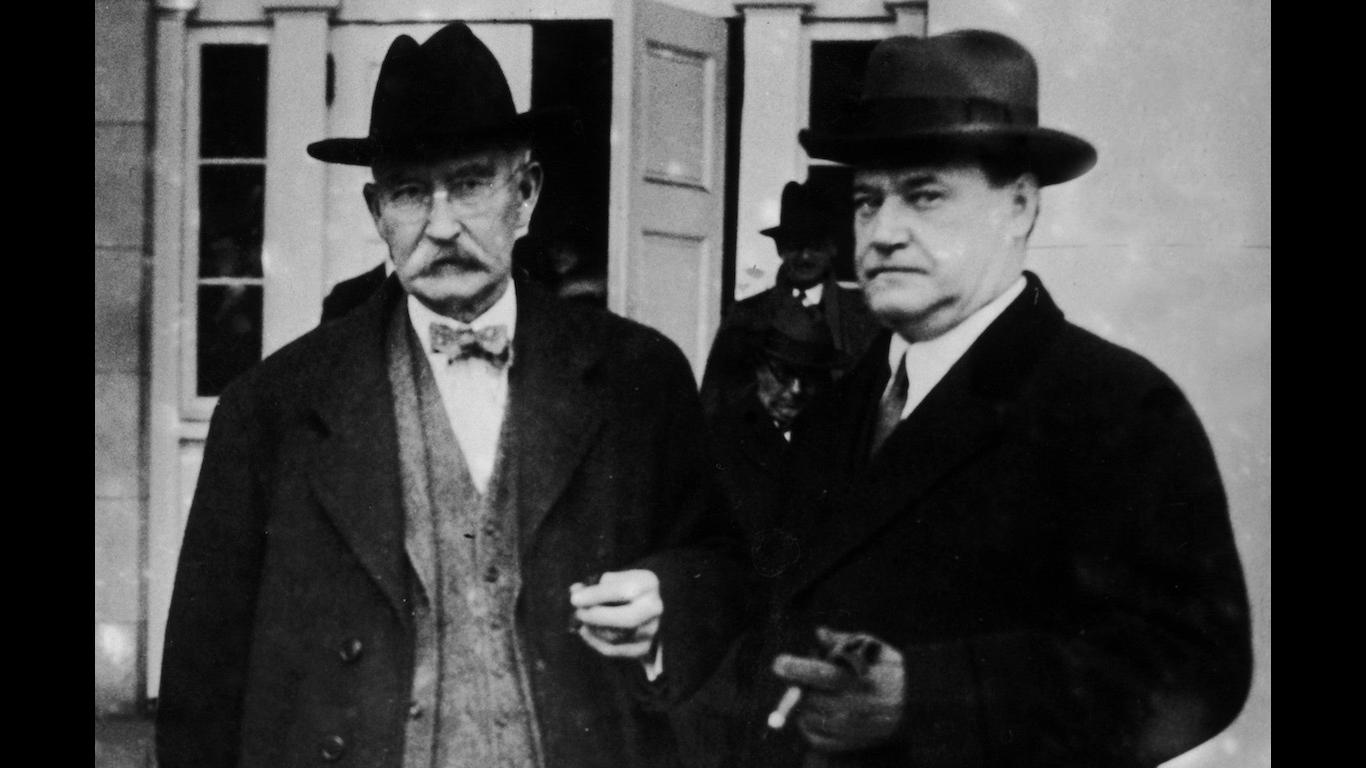
50. Wyoming
> Scandal: Teapot Dome scandal
> Year: 1927
The Teapot Dome scandal was considered to be the most serious scandal in the United States until the Watergate scandal in the early 1970s. The scandal gets its name from the Teapot Rock formation, located 25 miles north of Casper, Wyoming. In the early 20th century, U.S. Navy administrators requested that federally-owned land with known oil deposits be set aside by Congress as naval petroleum reserves. These reserves were not to be touched unless a national emergency was present.
However, once President Warren Harding’s Secretary of the Interior Albert Fall gained control of the Teapot Dome oil reserve, he made private deals with two oilmen who bribed him to drill into the Dome and two other oil reserves nearby. Fall went down in history as the first officer in a presidential cabinet to go to jail for crimes committed while in office.
Thank you for reading! Have some feedback for us?
Contact the 24/7 Wall St. editorial team.
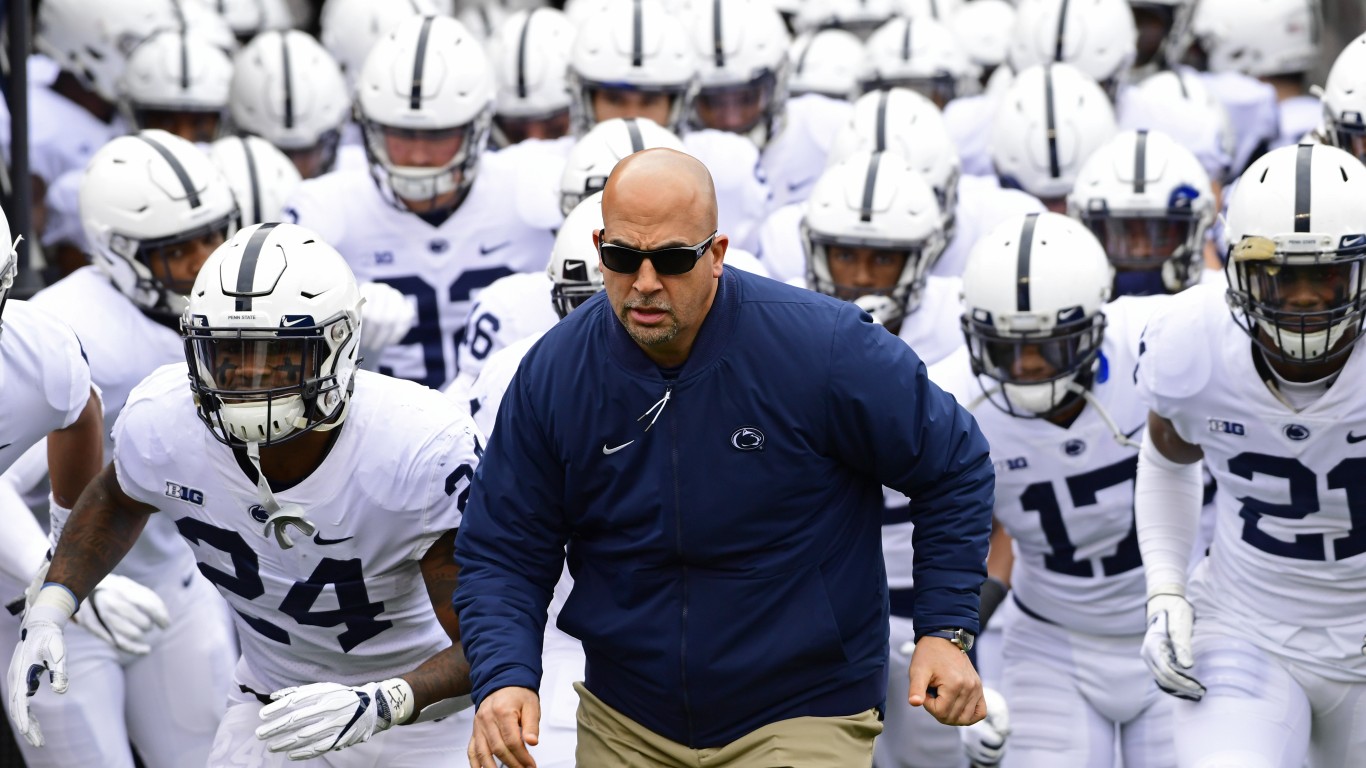 24/7 Wall St.
24/7 Wall St.
 24/7 Wall St.
24/7 Wall St.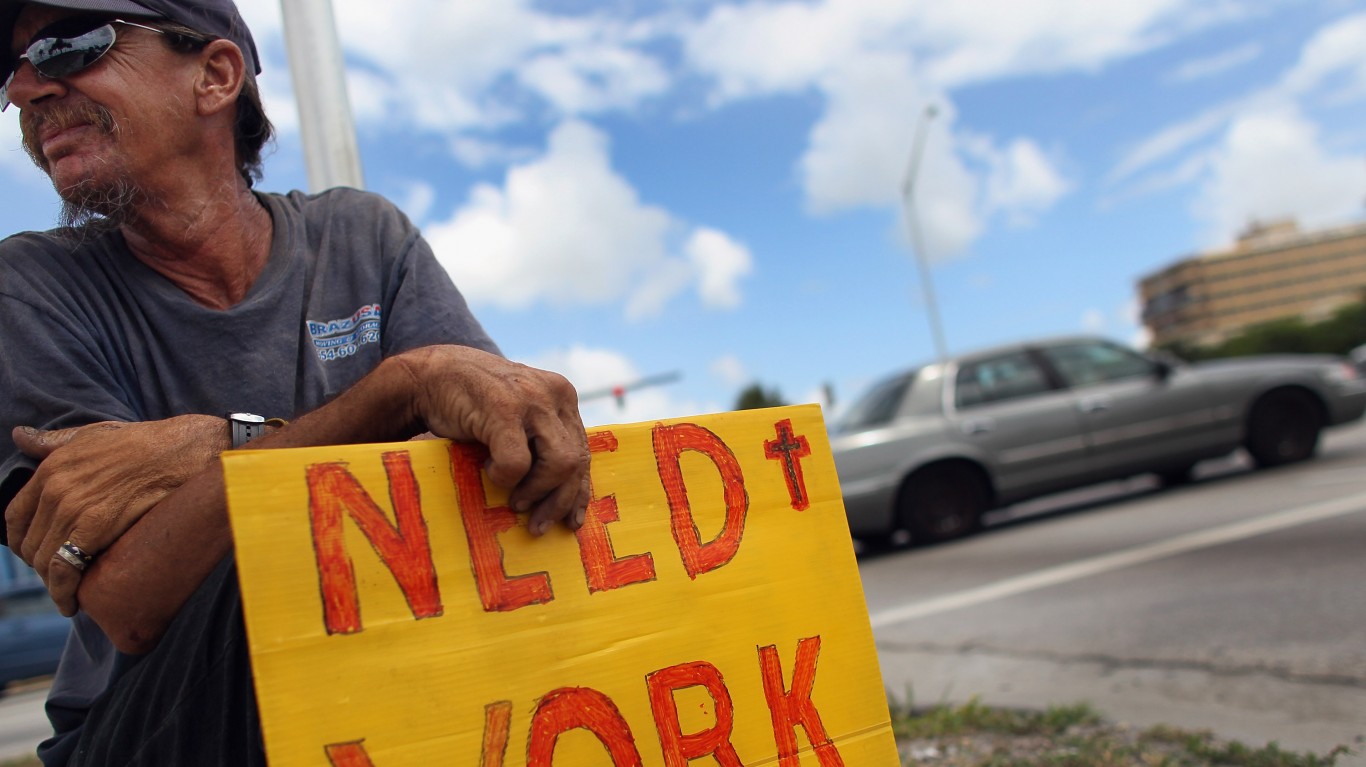 24/7 Wall St.
24/7 Wall St.